

Best questions for biography

Home » Questions » Best questions for biography
Writing a biography is an incredible way to preserve someone’s life story and share their experiences with the world. Whether you are writing a biography for a loved one, a historical figure, or a notable personality, having a list of well-thought-out questions is essential to gather all the necessary information. These questions serve as a guide to help you dig deeper into the person’s life, understand their journey, and showcase their accomplishments. In this article, we have compiled a comprehensive list of questions for biography that will assist you in creating a compelling narrative.
Before diving into the list of questions, it is crucial to understand that every biography is unique, and the questions you ask will depend on the individual you are writing about. It is essential to tailor the questions to suit their background, achievements, and the purpose of the biography. However, the following list provides a solid foundation to explore various aspects of a person’s life, including their childhood, education, career, relationships, and significant events.
Remember, a biography should not only focus on the person’s achievements but also provide insights into their personality, motivations, and struggles. These questions will help you create a well-rounded biography that captures the essence of the individual and leaves a lasting impact on your readers.
See these questions for biography
- What is your full name?
- Where and when were you born?
- Can you share some details about your childhood?
- What was your family background like?
- Who were your role models growing up?
- What were your favorite hobbies or activities as a child?
- Did you have any siblings? If so, how did they influence your life?
- What is your educational background?
- Who was your favorite teacher and why?
- What were your academic interests and strengths?
- Did you face any challenges or obstacles during your education?
- Can you recall any memorable experiences from your school days?
- How did your career journey begin?
- What motivated you to pursue your chosen career path?
- Did you face any setbacks or rejections while establishing your career?
- What were some significant milestones or achievements in your professional life?
- Who were your mentors or influencers in your career?
- What were some valuable lessons you learned from your professional experiences?
- How did you balance your personal and professional life?
- What led you to become involved in your community or charitable work?
- What are some of your most memorable moments in your career?
- Who are the most important people in your life?
- Can you share any stories about your relationships with family and friends?
- What are your core values and beliefs?
- What are some defining moments or turning points in your life?
- How do you handle challenges or adversity?
- What are your greatest strengths and weaknesses?
- How do you define success?
- What are your goals and aspirations for the future?
- What advice would you give to others aspiring to follow a similar path?
- Can you recall any funny or memorable anecdotes from your life?
- What are some of your favorite books, movies, or music?
- How do you unwind and relax?
- What are some of your favorite travel destinations?
- Have you ever faced any moments of self-doubt or imposter syndrome?
- What is the most valuable lesson you have learned in life?
- How do you want to be remembered?
- What legacy do you hope to leave behind?
- Is there anything else you would like to share about your life?
These questions for biography provide a starting point for your research and interview process. Remember to be respectful, empathetic, and open-minded while gathering information about someone’s life. A biography is an opportunity to honor and celebrate an individual’s journey, so approach it with care and curiosity. Good luck in creating a captivating biography that will inspire and educate readers for years to come!
Related Post:
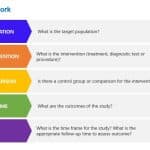
Leave a Comment Cancel reply
Save my name, email, and website in this browser for the next time I comment.

Best cryotherapy frequently asked questions

Best comfort food quotes

Best cryolipolysis frequently asked questions

Best comet the frog quotes

Best crumbl interview questions

Best comedian sam kinison quotes

© the narratologist 2024
How to Write a Biography in 8 Steps (The Non-Boring Way!)
Compelling biographies help us better connect with others while fostering empathy and understanding. Discover the steps to write one that captivates your audience!
Subscribe to our weekly newsletter
Have you ever been captivated by someone’s life story? From the ancient tales of great conquerors to the modern accounts of influential figures, biographies have enchanted readers and viewers for centuries.
The stories of real people’s lives not only entertain and educate but also provide a unique window into the human experience. In fact, according to research 1 https://www.ncbi.nlm.nih.gov/pmc/articles/PMC8796048/ , human stories like biographies can help us better connect with others while fostering empathy and understanding.
In this article, let’s dive into how to write a compelling biography, from the research phase to delivery.
What Are the Key Elements of a Biography?
The key elements of a well-written biography bring characters to life. They include thorough research, relevant interviews, clear structure, captivating prose, compelling themes, and a balance between objectivity and empathy.
- Thorough research: Helps create an accurate portrayal of your subject
- Relevant interviews: Insights help provide a deeper understanding of your subject
- Clear structure: Helps you outline your ideas for a compelling narrative
- Captivating prose: Provides descriptive language to paint a picture of your subject
- Compelling themes: Showcases the motivations and desires behind your subject
- A balance between objectivity and empathy: Keeps biases in check and allows your subject to shine for who they are
As you develop your biography, remember that these stories hold an enduring appeal because they offer people an opportunity to explore the depths of the human psyche, unravel extraordinary accomplishments, and discover the vulnerabilities and triumphs of individuals who have left their mark on the world.
Here are the topics a biography typically covers:
- Early life and background : Provide context about the subject’s upbringing, family, and cultural influences.
- Achievements and milestones: Highlight notable accomplishments, contributions, and significant events throughout their life.
- Challenges and struggles: Explore the obstacles they faced, the lessons learned, and how they overcame adversity.
- Personal characteristics: Describe their personality traits, values, beliefs, and motivations that shaped their actions and decisions.
- Impact and legacy: Discuss the lasting influence and contributions of the subject, both during their lifetime and beyond.
Ready to start crafting your biography? Find greater success with this helpful goal-setting resource!
How To Set Better Goals Using Science
Do you set the same goals over and over again? If you’re not achieving your goals – it’s not your fault! Let me show you the science-based goal-setting framework to help you achieve your biggest goals.
Let’s look at the six key elements of a well-written biography more closely and the steps you can follow to develop your own.
How to Write a Biography in 8 Steps Using Key Elements
Choose your presentation format.
Presenting your biography can take on various forms, the most traditional being written form. The basis for this article assumes you’re writing a conventional biography; however, this foundation can also help you create a multimedia presentation or website as well.
Consider these various formats to present your biography:
- Traditional Written Biographies: This classic approach provides a comprehensive account of a person’s life through the written word. Traditional biographies can be published in print or ebooks , allowing readers to engage deeply with the subject’s story.
- Multimedia Presentations: In the digital age, multimedia presentations offer a dynamic way to present biographies. Incorporate audio, video, photographs, and interactive elements to enhance the audience’s experience.
- Online Platforms: Online platforms, such as blogs or dedicated biography websites, provide accessible avenues for sharing biographies. They allow for easy updates, reader engagement, and the incorporation of multimedia elements.
Choose your subject and conduct research
To create a vivid and accurate portrayal of a person’s life, conduct extensive research. Dive into archives, read letters, examine diaries, explore photographs, and immerse yourself in the historical and cultural context surrounding your subject. This will help you unearth the small details that breathe life into your biography.
Whether you’re writing a biography about a historical figure, contemporary icon, or everyday individual, you’ll want to consider the different factors to focus on. Here are some examples of three types of individuals and the kind of research that will be most helpful.
- Historical Figures: When writing about historical figures, immerse yourself in their era. Understand the social, political, and cultural forces that shaped their lives. I recommend visiting your local library and connecting with a research librarian for support. Otherwise, other tools for historical research include Google Scholar. Analyze primary sources and multiple perspectives to present a well-rounded account.
- Contemporary Icons: Biographies of modern icons offer a chance to delve into their ongoing impact. Conduct interviews or gather insights from their close associates to understand their present-day influence. Stay current with the latest developments, and be prepared to update your work as the subject’s story unfolds.
- Everyday Individuals: Biographies need not be reserved for the famous. Every day individuals possess stories that can be just as compelling. Uncover the extraordinary within the ordinary, highlighting the struggles, triumphs, and personal growth of individuals who might otherwise remain unsung.
- Yourself! Want to write a biography on yourself? Autobiographies are a great way to explore who you are. Get ready to do some serious self-reflection with the steps below.
Pro Tip: Compile your research digitally using helpful cloud filings systems like Google Drive , OneDrive , or Dropbox . Organize your files by category, including information about their youth, family, achievements, and life lessons. You may also choose to write down research references or collect paper clippings on note cards, categorizing your physical files of research along the way.
Develop compelling themes and motifs
Identify overarching themes or motifs that emerge from the subject’s life. These could be resilience, ambition, love, or societal change. Weave these elements into the narrative, highlighting their significance and impact on the person’s journey. Here are some examples:
- Overcoming Adversity: These biographies feature perseverance, resilience, and determination. Examples include Helen Keller, Nelson Mandela, and Malala Yousafzai.
- Pursuit of Excellence: These biographies highlight people who have worked tirelessly to achieve their goals. Examples include Steve Jobs, Serena Williams, and Michael Jordan.
- Quest for Knowledge: These biographies focus on the curiosity that led to significant contributions to our world. Examples include Albert Einstein, Marie Curie, and Charles Darwin.
- Personal Transformation: These biographies explore a change in beliefs, values, or priorities. Examples include Malcolm X, Oprah Winfrey, and Maya Angelou.
- Legacy and Impact: These biographies examine a body of work that made a lasting contribution to society. Examples include Martin Luther King Jr., Mother Teresa, and Mahatma Gandhi.
Conduct relevant interviews
Whenever possible, seek firsthand accounts from those who knew or interacted with the subject. Conduct interviews with family members, friends, colleagues, or experts in the field. Their insights and anecdotes can provide a deeper understanding of the person’s character and experiences.
When conducting interviews for a biography, consider the following tips to ensure a productive and insightful conversation:
- Familiarize yourself with the interviewee’s background and accomplishments.
- Develop a list of well-thought-out questions that cover key aspects of their lives and experiences, including questions about your subject’s youth, family, achievements, and life transitions or struggles.
- Begin the interview by establishing a comfortable and friendly atmosphere to put the interviewee at ease.
- Show genuine interest in their story and listen actively to their responses.
- Ask open-ended questions encouraging detailed and reflective responses.
- Avoid yes/no questions and ask for their insights, memories, and personal perspectives.
- Some topics you might consider for your questions include early life, achievements, challenges, motivations, values, relationships, lessons learned, and advice.
- Pay close attention to the interviewee’s answers, body language, and tone of voice.
- Ask follow-up questions to clarify or delve deeper into specific topics.
- Show empathy and understanding, creating a safe space for the interviewee to share personal or sensitive information.
- Remain flexible during the interview, allowing the conversation to flow naturally.
- Be prepared to deviate from your prepared questions if unexpected but relevant topics arise.
- Respect the interviewee’s boundaries and be mindful of any topics they may not wish to discuss.
- Take thorough and organized notes during the interview to capture important details.
- Consider recording the interview (with permission) to ensure accurate quotes and references.
- Ask for permission to follow up with additional questions or for clarification.
- Doing a biography on yourself? Ask yourself deep questions to harvest new stories and anecdotes.
Remember, the goal of the interview is to gather valuable information and personal perspectives that will contribute to the authenticity and depth of your biography. Approach the interview process with sensitivity, respect, and genuine curiosity about the interviewee’s life and experiences.
Develop a clear structure
Outline your biography, ensuring a logical and engaging narrative flow. Consider the chronological order, significant milestones, and turning points in the subject’s life. Organize your gathered information to capture the essence of their journey while maintaining a compelling rhythm throughout.
A good outline for a biography can vary depending on the specific subject and the desired structure of the narrative. However, here’s a general outline that can serve as a starting point:
A. Introduction
a) Hook or engaging opening to capture the reader’s attention
b) Background information (birthplace, date, family, etc.)
c) A brief overview of the subject’s significance or why they are worth exploring
B. Early Life and Background
a) Childhood and upbringing
b) Influences, such as family, education, or cultural factors
c) Formative experiences or events that shaped the subject’s character or interests
C. Major Achievements and Milestones
a) A chronological exploration of the subject’s notable accomplishments, contributions, or milestones
b) Focus on key moments or achievements that highlight their impact or significance.
c) Provide context and details to paint a vivid picture of their achievements
D. Challenges and Obstacles
a) Discussion of the challenges, setbacks, or adversities the subject encountered
b) How they overcame obstacles or grew through difficult experiences
c) Insights into their resilience, determination, or problem-solving abilities
E. Personal Life and Relationships
a) Exploration of the subject’s relationships, such as family, friends, or romantic partners
b) Insights into their personal joys, struggles, or transformative experiences
c) How their personal life intersected with their professional or public achievements
F. Legacy and Impact
a) Examination of the subject’s lasting influence, contributions, or impact on society
b) Discuss how their work or actions continue to resonate or shape the world today
c) Reflection on their legacy and the lessons we can learn from their life story
G. Conclusion
a) Summarize the key aspects of the subject’s life and their significance
b) Provide a final reflection or insight on their overall journey or impact
c) Leave the reader with a lasting impression or call to action
Pro Tip: Looking for help drafting an outline to get you started? Use free tools like ChatGPT to jumpstart your outline by putting in a prompt request like, “Write an outline for a biography about X, including any relevant details on the subject that should be included.”
Craft captivating prose
Employ descriptive language to transport readers into the subject’s world. Paint vivid portraits of their physical appearance, mannerisms, and surroundings. Use sensory details to evoke emotions and create a strong connection between the reader and the subject.
Here are some examples:
- “She was a force of nature, with a fierce determination and an unwavering commitment to justice.” (Ruth Bader Ginsburg)
- “His piercing blue eyes seemed to look right through you, and his voice had a commanding presence that demanded attention.” (Winston Churchill)
- “She moved with a grace and elegance that belied her inner strength and resilience.” (Audrey Hepburn)
- “His rugged features and piercing gaze made him a natural leading man, but it was his depth and vulnerability that set him apart.” (Marlon Brando)
- “She had a contagious energy and a magnetic personality that drew people to her like a moth to a flame.” (Princess Diana)
- “His quiet intensity and unwavering dedication to his craft made him one of the greatest artists of his time.” (Leonardo da Vinci)
Action Step: While writing descriptive prose takes some practice, it’s an art you can master with little creative writing skills. To help you write descriptive prose, practice closing your eyes and imagining your subject.
- What expression is on their face?
- How are they dressed?
- What does their body language express?
- How do they smell?
- How do they make you feel?
- How do they make others feel?
- What’s in their surroundings?
- What are they doing with their hands?
- What do you imagine they’re thinking about?
With questions like these, you’ll start to use descriptive language to bring your subject to life.
Build a balance of objectivity and empathy
Strive for an objective portrayal while infusing empathy and understanding into your writing. Remain aware of biases and preconceived notions, giving your subject the space to shine in their unique light.
To check yourself, filter your writing and interviewing with these tips:
- Verify Information: Cross-reference information from various sources to ensure accuracy. Use tools like Fact Check Explorer to fact-check claims, dates, and events to avoid errors or inaccuracies that could skew the narrative.
- Multiple Perspectives: Seek out different viewpoints on the subject. This includes interviewing or reaching out to people with significant interactions or relationships with the subject. Incorporating diverse perspectives can counterbalance biases and provide a broader understanding.
- Empathetic Listening: During interviews or conversations, practice active listening and empathize with the interviewee’s experiences and emotions. This allows you to understand the subject’s perspective and incorporate their insights and feelings into the narrative.
- Contextualize Emotions: When sharing the subject’s emotional experiences or personal struggles, provide sufficient context and background. This helps readers understand the motivations and circumstances behind their actions and allows for empathetic understanding without veering into excessive sentimentality.
- Credible Interpretation: While interpreting the subject’s thoughts, motives, or intentions, be clear about what is factual and what is speculative. Clearly distinguish between evidence-based information and your interpretations to maintain objectivity.
- Respect Boundaries: Be mindful of the subject’s privacy and any requests they may have regarding sensitive or personal information. Respecting their boundaries shows empathy and allows for a respectful portrayal while maintaining the necessary level of objectivity.
- Acknowledge Limitations: Recognize that achieving complete objectivity in a biography is challenging. Biases can inadvertently seep into the narrative. However, by being aware of your biases and consciously presenting a fair and balanced account, you can mitigate their influence.
Respect truth, privacy, and sensitivity
Remember, writing biographies carries ethical responsibilities. It’s important to maintain accuracy through credible research and gain consent while being sensitive to controversial or difficult topics. Here are some considerations:
- Accuracy: Maintain a commitment to truth and accuracy. Verify facts and corroborate information from multiple sources to ensure the reliability of your narrative. Cite your sources and be transparent about any uncertainties or gaps in knowledge.
- Privacy and Consent: Respect the privacy of living individuals mentioned in your biography. Seek consent when sharing personal details or sensitive information. Balance the subject’s right to privacy with the importance of honesty and transparency.
- Sensitivity: Approach sensitive or controversial topics with care and empathy. Consider the potential impact of your words on the subject’s loved ones or affected communities—present differing perspectives without sensationalism or bias.
Writing a Biography FAQs
The length of a biography can vary greatly, depending on the subject and the depth of exploration. Some biographies span a few hundred pages, while others extend to multiple volumes. Focus on capturing the subject’s life’s essence rather than strictly adhering to a predetermined length.
Some common mistakes to avoid when writing a biography include the following: Lack of thorough research or reliance on a single source. Inaccurate or misleading information. Excessive personal bias or projection onto the subject. Neglecting to verify facts or failing to cite sources. Poor organization or a disjointed narrative flow. Neglecting to balance objectivity with empathy. Overloading the biography with irrelevant details or digressions. Failing to respect privacy or ethical considerations.
While chronological order is commonly used in biographies, it is not required. Some biographers employ a thematic approach or explore specific periods or events in the subject’s life. Experiment with different structures to find the most engaging way to tell your subject’s story.
The purpose of writing a biography is to capture and share an individual’s life story. Biographies provide insights into a person’s experiences, achievements, and challenges, offering readers inspiration, knowledge, and understanding. They preserve the legacy of individuals, contribute to historical records, and celebrate the diversity of human lives.
When choosing a subject for your biography, consider someone who inspires you, interests you, or has significantly impacted society. It could be a historical figure, a contemporary icon, or even an everyday individual with a remarkable story. Choose a subject with sufficient available information, access to primary sources or interviews, and a narrative that resonates with you and potential readers.
Key elements to include in a biography are: Early life and background: Provide context about the subject’s upbringing, family, and cultural influences. Achievements and milestones: Highlight notable accomplishments, contributions, and significant events throughout their life. Challenges and struggles: Explore the obstacles they faced, the lessons learned, and how they overcame adversity. Personal characteristics: Describe their personality traits, values, beliefs, and motivations that shaped their actions and decisions. Impact and legacy: Discuss the lasting influence and contributions of the subject, both during their lifetime and beyond.
Including personal anecdotes can add depth and humanize the subject of your biography. However, be selective and ensure that the stories are relevant, contribute to understanding the person’s character or experiences, and align with the overall narrative. Balancing personal anecdotes with factual information is critical to maintaining accuracy and credibility.
Conducting research for a biography involves exploring a variety of sources. Start with primary sources such as personal papers, letters, journals, and interviews with the subject or people who knew them. Secondary sources such as books, articles, and academic papers provide additional context and perspectives. Online databases, archives, libraries, and museums are valuable resources for finding relevant information.
Consult a wide range of sources to ensure a comprehensive and accurate biography. Primary sources, such as personal documents, letters, diaries, and interviews, offer firsthand accounts and unique insights. Secondary sources provide broader context and analysis, including books, articles, scholarly works, and historical records. Remember to evaluate the credibility and reliability of your sources critically.
Organize the information in your biography logically and engagingly. Consider using a chronological structure, starting with the subject’s early life and progressing through significant events and milestones. Alternatively, adopt a thematic approach, grouping related information based on themes or significant aspects of their life. Use clear headings, subheadings, and transitions to guide readers through the narrative flow.
Writing Biographies Key Takeaways
In summary, take note of these ideas and tips before you start writing your biography:
- Biographies hold enduring appeal, offering a glimpse into the human experience across time.
- Thorough research, interviews, and captivating prose are essential for crafting compelling biographies.
- Ethical considerations, such as accuracy, privacy, and sensitivity, are crucial when writing about real people’s lives.
- Choose subjects that genuinely inspire and resonate with you.
- Immerse yourself in the subject’s world to understand their motivations and challenges.
- Develop strong research skills and utilize a wide range of sources.
- Craft a compelling narrative that engages readers from the very first page.
- Seek feedback from trusted sources to refine your writing and storytelling abilities.
- Continuously explore new biographies to broaden your understanding of different styles and approaches.
- Embrace the unique voice and perspective you bring to the storytelling process.
Writing a biography book? Check out this helpful article, How to Write a Book: 10 Questions to Ask Before You Start Writing !
Article sources
Popular guides, how to deal with difficult people at work.
Do you have a difficult boss? Colleague? Client? Learn how to transform your difficult relationship. I’ll show you my science-based approach to building a strong, productive relationship with even the most difficult people.
Related Articles
Science of People offers over 1000+ articles on people skills and nonverbal behavior.
Get our latest insights and advice delivered to your inbox.
It’s a privilege to be in your inbox. We promise only to send the good stuff.
Writing a Bio: My 20 Favorite Questions to Ask

Writing a concise bio for a business website may seem like a no brainer. A few paragraphs, hit all the usual points like schools, charity work, career highlights and then, BAM! Bio, check.
The problem with that approach? There’s a high likelihood you’ll churn out super boring bios, fast. When I think of old school bios, I think of a stuffy headshot accompanied by a few paragraphs of text that no one wants to read. But the days of stale bios are over. Believe it or not, people actually want to learn about you and your company, and they’d rather not fall asleep while doing it.
A well-written bio will combine the overall company culture and voice with that of the profiled team member. While website bios are generally concise—anywhere from Twitter-short to a few paragraphs—choosing the particulars to highlight can be tricky. Gathering the right information up front, in a 15-20 minute interview, is key.
Here are my favorite questions to ask when writing a bio. Note: these don’t include the usual slew, like general career experience and education.
1. Who is someone you admire, and why?
2. Tell me three pet peeves.
3. What’s a typical day like for you?
4. Do you have any skills or talents that most people don’t know about?
5. If you could be anywhere other than here, right this minute, where would you be? (Don’t overthink it!)
6. Flashback to when you were 10 years old. What do you want to be when you grow up?
7. If we went to happy hour, what would you order?
8. Finish this sentence. On Sunday mornings, you can usually find me...
9. How do you want people to remember you?
10. What do you think are the best skills that you bring to your job?
11. Name three words that you describe you.
12. How do you think your colleagues would describe you?
13. What do you want to make sure you do before you die?
14. What’s a goal you have for yourself that you want to accomplish in the next year?
15. Name a few of your daily habits (other than a shower and brushing your teeth).
16. What publications do you regularly read?
17. What are you happiest doing, when you’re not working?
18. What are some causes you care about?
19. What do you do with friends in your spare time?
20. What would be your personal motto
Joanna Furlong
Copyright 2018 Joanna Furlong, Freelance Writer. All rights reserved.

- How it works
- Browse Our Writers
- Write For Us
- Testimonials
- Free Consultation
[PDF Download] 65 Memory Prompts: How to Write Your Biography, Life Story or Memoir
Capture memories you didn't know you had .
Wondering how to write your biography? Whether you are writing yourself, or working with a ghostwriter , it can be hard to know where to start and what to include. At Story Terrace, we often use memory prompts to kick-start the process - easy and fun questions designed to jog your memory and bring back moments you haven't thought about for years.
It's the perfect first step, and something you can later assemble into a timeline or structure for your story. We’ve hand-picked 65 of our favourite memory prompts to share with you. You can check out 9 example prompts right here on the blog - but make sure to download the full list of 65, which we've assembled into a print-ready PDF for you.
Remember - the idea is not to answer every question. Just scan through the list, and think about which of these prompts speak to you the most. You’ll soon find you have more than enough to talk about.
.jpg?width=1349&name=les-anderson-175603%20(1).jpg)
How to Write Your Biography: Childhood
1. What is your earliest memory?
2. Talk about your family’s heritage and history.
3. What did your childhood home look like?
How to Write Your Biography: Adolescence
4. How did your physical appearance change in your teenage years? What was that change like for you?
5. How was your relationship with your parents?
6. Who was your first crush?
How to Write Your Biography: Adulthood
7. What did an ordinary day in your life look like?
8. Name a big success story for you during this time
9. Did you travel? What was your most memorable vacation?
Hopefully writing your biography just got a little easier and these prompts have got your brains in gear, recalling all sorts of different memories from your childhood all the way through to just yesterday!
Remember to download the full list for all 65 questions to jog your memory.
Download the full list of 65 Memory Prompts!
Download Now (Click Here)
More stories in this category
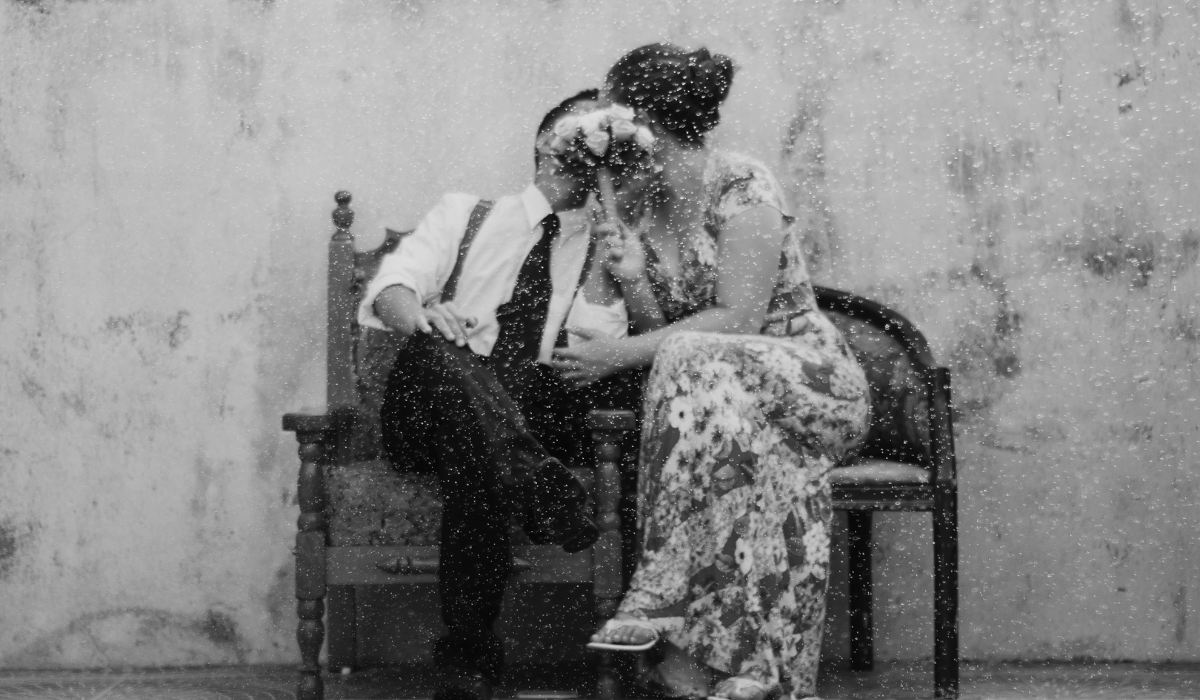
Love and Dating Across the Centuries
Have you ever wondered how dating began?
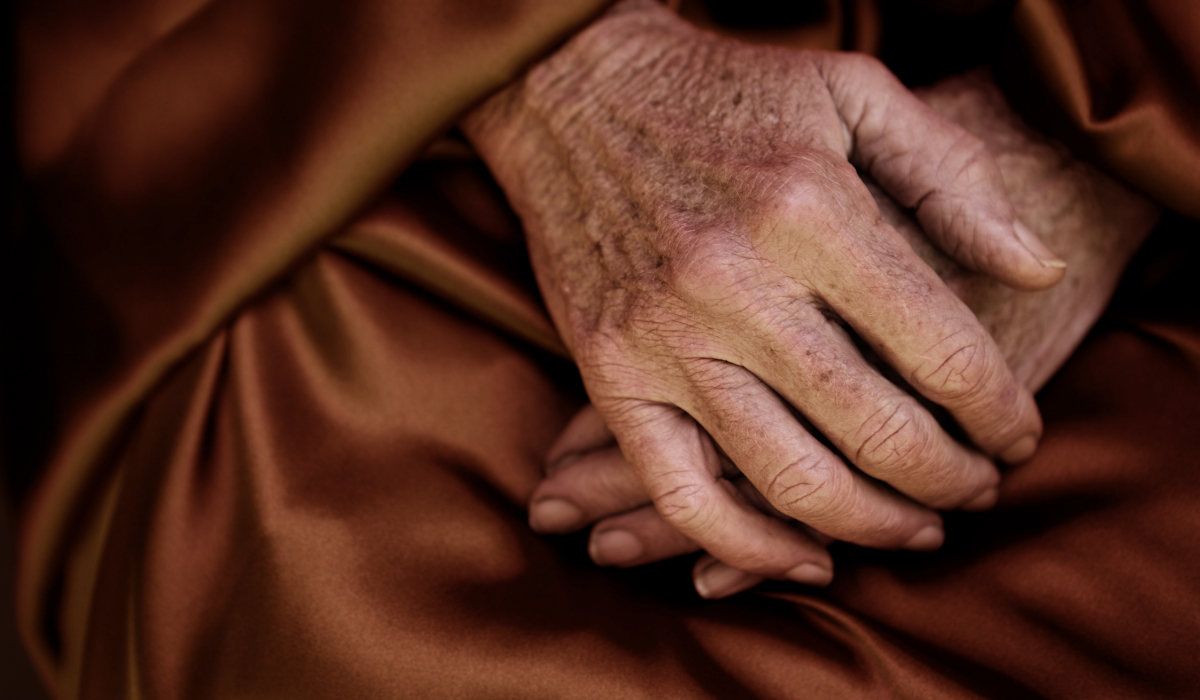
Lessons From 100 Years of Life
We all know the saying: With age comes wisdom.
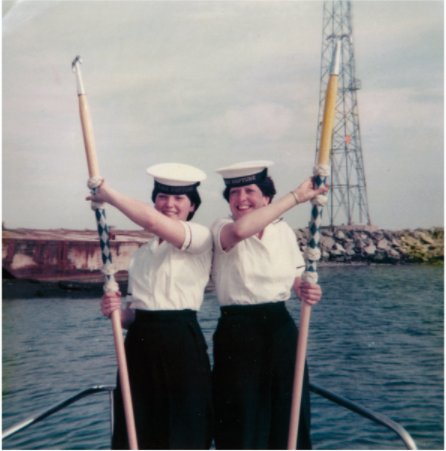
Meet Desiree Home: And Then, Positivity
Desiree Home has two simple yet powerful words for her catch...
Create a book with Story Terrace
Submit your details to learn more about our writers, how it works, and our pricing & packages
Free Timeline Template
Submit your details to receive our timeline template. Plus we'll send you more guides, templates and resources in the coming weeks!
Free Guide: 65 Memory Prompts
Submit your details to receive the 65 Memory prompts we use to start writing a life story. Plus we'll send you more guides, templates and resources in the coming weeks!
Writer Match
Check for a writer near you.
Enter a zip code to look for writers near you. We can arrange your interviews by phone, video call or in person.
Capturing Your Parents' Story with Story Terrace
- Terms & Conditions
- How it Works
+1 (323) 446-2870 [email protected] 113 N. San Vicente Blvd, Suite 200 Beverly Hills, CA 90211
© 2022 by StoryTerrace.
Subscribe to our newsletter to receive regular updates. You can unsubscribe at any time. Read our privacy policy .
Follow us on social media.
The Book Report Network
- Bookreporter
- ReadingGroupGuides
- AuthorsOnTheWeb

Sign up for our newsletters!
Find a Guide
For book groups, what's your book group reading this month, favorite monthly lists & picks, most requested guides of 2023, when no discussion guide available, starting a reading group, running a book group, choosing what to read, tips for book clubs, books about reading groups, coming soon, new in paperback, write to us, frequently asked questions.
- Request a Guide
Advertise with Us
Add your guide, you are here:, biography discussion questions.

- For the person who chose this book: What made you want to read it? What made you suggest it to the group for discussion? Did it live up to your expectations? Why or why not?
- What did you know about the subject prior to reading this book? Did you learn anything new about this person? If you knew of the subject before, did anything you read change your opinion?
- What is the subject's most admirable quality? Is this someone you would want to know or have known?
- What did you find to be the most interesting events in this book? What, if anything, surprised you?
- If this person impacted history, discuss what may have been different without his or her presence.
- What did you learn about the time period in which the book is set that you did not previously know? Discuss the time period in history that each person in the group enjoys reading about most, and why.
- Has reading this book inspired you to do further research on the subject and the time period discussed?
- Compare this book to others your group has read. Is it similar to any of them? Did you like it more or less than other books you've read? What do you think will be your lasting impression of the book as a whole? How about the subject specifically?
- What did you like or dislike about the book that hasn't been discussed already? Were you glad you read this book? Would you recommend it to a friend? Do you want to read more works by this author or more about the book's subject?
- readinggroupguides.com on Facebook
- readinggroupguides.com on Twitter
- readinggroupguides on Instagram

- How to Add a Guide
- Privacy Policy
- Cookie Policy
- Newsletters
Copyright © 2024 The Book Report, Inc. All Rights Reserved.
MELODY DEXTER
How to ask questions in a biographical interview
By Melody Dexter | 12 Jan 2022

When it comes to questions, there’s a lot to cover. First, let’s look at how to ask questions, then in the next article, we’ll look at what types of questions you can ask.
Make it like conversation
In the spirit of keeping everyone comfortable, historian Studs Terkel said a successful interview should be like “engaging in conversation, having a cup of coffee” (cited by Ritchie). Terry, an interviewee of Terkel said that Terkel “doesn’t ask particularly probing questions, and yet he’s able to get people to open up and tell these marvellous little stories about themselves. He’s a good listener” (cited by Ritchie).
In an interview with Literary Hub, Nobel Laureate and oral historian Svetlana Alexievich said, “I never call what I do ‘interviews’. We speak to each other as neighbours, in a new genre that is required by our time. It is a history of human feelings”.
As you would in a regular conversation, keep tabs on your interviewee’s interest and their comfort. Ascough, Curthoys and McGarth say to note their energy levels and to watch if fatigue is starting to set in, however, as discussed in “Before the interview” the length of the interview should ideally be defined before it even begins.
Start with enjoyable topics
Talmage reminds us to remember that what you say first will affect the rest of the interview. Ritchie suggests starting with easy questions that are not “too abrupt and confrontational; instead, build up to the climactic questions by establishing the historical setting and making the interviewee more comfortable with the process”.
One way of doing this is starting with a discussion of topics the interviewee enjoys talking about before moving onto harder questions. Donald Ritchie shared an example of when this wasn’t possible: one interviewer was going to interview Edward Teller, a nuclear physicist – Teller arrived late and they had limited time – the interviewer skipped the easier, non confrontational questions and asked about the most controversial part. Teller responded by saying, “This interview is over” and left.
Consider leaving the difficult or critical questions until the middle or end of the interview, as they may need a break after these questions, or, Miller notes that they might choose to end the interview at or after this point. DeLouise & Harrington suggest that if you are interviewing someone who is sick or elderly, consider asking the critical questions first.
Handling short answers and sensitive topics
If you find that your interviewee is providing short answers, not answering in enough detail or being deliberately evasive, Ritchie suggests that this could be happening because the interviewer “is asking too many specific questions and not enough open-ended ‘how’ and ‘why’ questions” and also sometimes “interviewees are not always sure of how much detail interviewers want” or perhaps the interviewer has moved on to the next questions too quickly.
It could also be because the person is not particularly interested in the questions being asked, in which case it may be best to move onto another topic, or even consider ending the interview. If responses are short or evasive, Rollyson suggests the interviewee might perceive the topic to be controversial. People don’t always want to talk about difficult things, Ritchie notes that “interviewers must be prepared to ask questions about painful and embarrassing subjects – although they must also respect people’s right not to answer such questions, if they so choose”.
A trick Ritchie uses to ask difficult questions is to “quote someone else”, for example, “The Washington Post reported that you left office because of such and such. Was this a fair assessment?”. If the interviewee is defensive, come back to the topic later, even at a different interview session. In Doing Oral History, Adams is cited “When bringing up sensitive subjects, however, be careful not to appear embarrassed yourself. Interviewees will sense this, and it will make them uncomfortable, affecting their responses”.
Keep it simple
As well as starting with easier questions, keep the conversation simple by asking only one question at a time: avoid double-barrelled questions. Asking more than one question at a time may result in the interviewee choosing to only answer one part, either intentionally or simply because they forgot and if they forget, it means you’ll need to ask the question again anyway. Hamilton notes that asking many questions at once can result in the interviewee feeling overwhelmed, they may take offence or feel manipulated.
Next, let’s look at types of questions to ask in a biographical interview.
Further reading >
Join the conversation
Submit a comment cancel reply.
Your email address will not be published. Required fields are marked *
Save my name, email, and website in this browser for the next time I comment.
Submit Comment

10 Great Tips for a Life Story Interview

Capturing someone’s life story is a great and worthwhile endeavor. My grandmother was a very influential person in my life. Unfortunately, my son will never know her as I did. Fortunately, I have done life story work with her. Through her life story, one day my son can connect with her personality, her memories, and gain an understanding of the broader historical context in which she grew up.
Start Preserving Family History Today
For a simple, guided way to digitally record and store life histories for yourself or a loved one, check out Storii .
Storii offers a Life Story Gift Box, which makes a great gift for grandparents . Your loved one doesn't need WiFi or a smartphone - Storii works with landline phones too! They receive calls on selected days and times asking meaningful life story questions. Their answers are recorded, transcribed and stored on their secure Storii profile, where they can be downloaded as a book or an audiobook. Recordings can be shared with other family members who would enjoy hearing them too!
Don't miss the opportunity to have your loved one's personal history preserved. Check out how simple and easy Storii's Life Story Calls makes it to capture your friend or family member's memories and stories. Storii makes a great gift and enables people to build up a legacy over time to be cherished for many lifetimes.

Benefits of Life Story Interviews
Life stories are not just a gift to future generations. Life story interviews, or even casual reminiscing, have positive outcomes for both the person asking questions and the person being interviewed. Benefits of conducting life story interviews may include:
- Builds self-confidence for both participants
- Meaningful conversations combat feelings of isolation and loneliness
- Helps elderly people resolve conflicts and fears as they reflect on their life
- Preserves family stories and traditions
- Promotes intergenerational connection and understanding
Tips for Carrying Out Life Story Interviews
If you are planning to record a loved one’s life story, it is a good idea to prepare ahead of time. Here is some helpful best practice advice when it comes to a life story interview.
- Have a pre-interview meeting. Before you start your interview it’s a good idea to ask the person you’re interviewing what they hope to get out of this. What do they want people to know or remember about them? What is the legacy they want to leave behind? Do they want to go over their entire life or focus on a specific aspect or part? Is anything off-limits or are they an open book? This will set you up for success, help guide your interview questions and give you a little bit of structure, to begin with.
- Record in multiple formats . Where possible, record the interview on audio and video. If something goes wrong with one file, you have the other as a backup. Additionally, it enables you to sit hands-free and give undivided attention to the person you’re interviewing. Finally, it gives you more material to work with and allows you to experiment with using multiple formats in finished life story you create. Please note, if using a video camera, set it up out of your interviewee’s line of vision. This way, the conversation will feel more natural and there won’t be an obvious distraction.
- Start with easy questions. Naturally, there can be some nervousness at the beginning of an interview. Therefore, it’s best to ease in with some easy, non-intrusive questions and work your way to more difficult or personal ones.
- Don’t do it all at once . It can be hard to answer questions on the spot. We may get asked a question that we churn over and over in our mind, only to come up with an answer or memory days later. If you can, consider taking breaks and doing this interview over a few days, weeks or months. Your loved one may recall memories in the time between your conversations that end up contributing rich reminiscence material to their life story.
- Seek out memory stimulation . We all know that memories are generally ‘triggered’ by external factors like a hearing a song or seeing a photograph. To help your loved one jog memories and connect with their past, have conversations on walks, drive to places that were significant to your loved one, go through boxes of photos and keepsakes, etc.
- Stick to asking open-ended questions (e.g. “Tell me about…”, “Describe what it was like…”, “How did you feel when…”, “Why do you think…”). As you listen to their answers be thinking of immediate follow-up questions that help you dive deeper into the story.
- Practice active-listening techniques .
- Don’t exclusively ask about life events. Reading or listening to a story that is simply recounting a chronological list of life experiences isn’t interesting or engaging. A life story should convey who that person was, not just what happened to them or what they did. When you’re interviewing, ask about their motivations, their fears, their values, beliefs, and personal ideologies.
- Embrace the emotions that come . When reflecting on one’s life it is common for there to be moments of silence, tears of sadness, and topics too painful to speak about. Be sensitive and understanding. Never pressure someone to continue discussing something that is making them uncomfortable. Always show empathy by affirming their emotions and offering a gesture of support like holding their hand or offering a tissue.
- Consider speaking with people who are close to your interviewee. If you have access to the spouse, siblings, friends, or children of the person you’re interviewing, consider speaking to them. You can ask them to tell you about their favorite memories with this person, what he or she has meant to them, what they were like, etc. Having these supplemental stories and perspectives can enhance the whole picture you create of who this person is and what he or she meant to those around them.
When you've finished your interviews, be sure to read our guide on How to Start Writing a Life Story.

Our newsletter
Get great curated articles every week..

Legacy Video Production
Biography Questions
Have you ever wanted to know what your mother was like as a child? Where your grandfather was from? How your parents met? Below are 50 Biography Questions to ask your parents or grandparents to learn more about their life stories and your family history.
As a Legacy Video producer, I ask well over 100 questions in an interview so be sure to add your own to the list. And don’t forget to ask follow-up questions!
50 Biography Questions
- What is your full name?
- When were you born?
- Where were you born?
- Were you named after anyone?
- What is/was your mother’s name?
- What is/was your mother’s maiden name?
- Where was she from?
- What do you now about your mother’s early years?
- What were your mother’s parents’ names?
- Where were they were from?
- What did they do for a living?
- Do you know any more about your mother’s family history?
- What was/is your father’s name?
- Where was he from?
- What do you know about your father’s early years?
- What were your father’s parents’ names?
- Do you know any more about your father’s family history?
- How did your parents meet?
- Do you have any siblings?
- Where did you grow up?
- Describe the neighborhood/s.
- Describe your childhood home/s.
- What schools did you attend?
- What were your favorite subjects?
- Did you have any chores?
- How did you spend your free time?
- Did you have any summer or after school jobs?
- How would you describe yourself as a child?
- What role did religion play in your life?
- What values were important to your parents?
- What did you father do for a living?
- How did you mother spend her days?
- Was there a significant event in your early years that shaped who you are today?
- Did you go college?
- If so, how did you pay for school and how much was it?
- How did you decide on your career?
- Describe your career.
- What career advice would you give to your grandchildren?
- How did you meet your spouse?
- What was your first impression of him/her?
- Describe your wedding .
- List the names and birthdates of your children.
- How did having children change your life?
- What advice would you give your grandchildren on parenting?
- What do you most admire about your spouse?
- What advice would you give your grandchildren on marriage?
- What do you consider your greatest accomplishment?
- What values do you wish you passed on to your children?
For tips on interviewing a parent or grandparent, visit my post: ‘Interviewing a Grandparent’.
For ways to record your parents or grandparents stories, visit my post: ‘Recording a Grandparent’s Stories’.
Or let us do the work for you!
~ Legacy Videos ~
Give your parent or grandparent the gift of a lifetime by capturing their life story for your family to know.

Here at Family Tree Video we produce Legacy Videos, modern-day memoirs that weave a filmed interview with a parent or grandparent together with family photos, documents, maps and other memorabilia. The result is a beautiful “moving portrait” capturing your loved one as they recount their life story, family history and memories – a gift your family will treasure for generations to come.
To learn more about giving the gift of a Legacy Video, visit us at FamilyTreeVideo.com .
Family Tree Video LLC Legacy Video Production (312) 402-6406
Susan Saunders Owner/Producer
Like us on Facebook! Follow us on Instagram! ‘Biography Questions’
“There are only two lasting bequests we can give our children. One is roots, and the other, wings.” H. S. Carter
Legacy Videos
Capturing life stories and family history for future generations, ~ the gift of a lifetime ~.
Family Tree Video Video Biographies ~ Video Memoir ~ Family History Video Family Documentaries ~ Anniversary Videos Video Tributes ~ Heirloom Videos Biography Questions ~ Since 2008 ~
Leave a comment cancel reply.
How to Write an Interesting Biography
- Homework Tips
- Learning Styles & Skills
- Study Methods
- Time Management
- Private School
- College Admissions
- College Life
- Graduate School
- Business School
- Distance Learning
- M.Ed., Education Administration, University of Georgia
- B.A., History, Armstrong State University
A biography is a written account of the series of events that make up a person's life. Some of those events are going to be pretty boring, so you'll need to try to make your account as interesting as possible!
Every student will write a biography at some point, but the level of detail and sophistication will differ. A fourth grade biography will be much different from a middle school-level biography or a high school or college-level biography.
However, each biography will include the basic details. The first information you should gather in your research will include biographical details and facts. You must use a trustworthy resource to ensure that your information is accurate.
Using research note cards , collect the following data, carefully recording the source for each piece of information:
Including Basic Details
- Date and place of birth and death
- Family information
- Lifetime accomplishments
- Major events of life
- Effects/impact on society, historical significance
While this information is necessary to your project, these dry facts, on their own, don't really make a very good biography. Once you've found these basics, you'll want to dig a little deeper.
You choose a certain person because you think he or she is interesting, so you certainly don't want to burden your paper with an inventory of boring facts. Your goal is to impress your reader!
Start off with great first sentence . It's a good idea to begin with a really interesting statement, a little-known fact, or really intriguing event.
You should avoid starting out with a standard but boring line like:
"Meriwether Lewis was born in Virginia in 1774."
Instead, try starting with something like this:
"Late one afternoon in October, 1809, Meriwether Lewis arrived at a small log cabin nestled deep in the Tennessee Mountains. By sunrise on the following day, he was dead, having suffered gunshot wounds to the head and chest.
You'll have to make sure your beginning is motivating, but it should also be relevant. The next sentence or two should lead into your thesis statement , or main message of your biography.
"It was a tragic end to a life that had so deeply affected the course of history in the United States. Meriwether Lewis, a driven and often tormented soul, led an expedition of discovery that expanded a young nation's economic potential, increased its scientific understanding, and enhanced its worldwide reputation."
Now that you've created an impressive beginning , you'll want to continue the flow. Find more intriguing details about the man and his work, and weave them into the composition.
Examples of Interesting Details:
- Some people believed that Lewis and Clark would encounter elephants in the western wilderness, having misunderstood the wooly mammoth bones discovered in the United States.
- The expedition resulted in the discovery and description of 122 new animal species and subspecies.
- Lewis was a hypochondriac.
- His death is still an unsolved mystery, although it was ruled a suicide.
You can find interesting facts by consulting diverse sources.
Fill the body of your biography with material that gives insight into your subject's personality. For instance, in a biography about Meriwether Lewis, you would ask what traits or events motivated him to embark on such a monumental exercise.
Questions to Consider in Your Biography:
- Was there something in your subject's childhood that shaped his/her personality?
- Was there a personality trait that drove him/her to succeed or impeded his progress?
- What adjectives would you use to describe him/her?
- What were some turning points in this life?
- What was his/her impact on history?
Be sure to use transitional phrases and words to link your paragraphs and make your composition paragraphs flow . It is normal for good writers to re-arrange their sentences to create a better paper.
The final paragraph will summarize your main points and re-assert your main claim about your subject. It should point out your main points, re-name the person you're writing about, but it should not repeat specific examples.
As always, proofread your paper and check for errors. Create a bibliography and title page according to your teacher's instructions. Consult a style guide for proper documentation.
- Examples of Great Introductory Paragraphs
- How to Write a Good Thesis Statement
- How to Write a Personal Narrative
- 10 Steps to Writing a Successful Book Report
- The Introductory Paragraph: Start Your Paper Off Right
- How to Write a Solid Thesis Statement
- Tips for Writing an Art History Paper
- How to Write a Great Book Report
- How to Write a Narrative Essay or Speech
- How to Help Your 4th Grader Write a Biography
- The Ultimate Guide to the 5-Paragraph Essay
- How to Write a Research Paper That Earns an A
- How to Write a Film Review
- Overused and Tired Words
- How to Write a Great Essay for the TOEFL or TOEIC
- Assignment Biography: Student Criteria and Rubric for Writing

Tell Your Story with Evalogue.Life
Everyone has an important story. Tell yours now, and it will be enough.
Great Interview Questions

Great interviews start with great questions. We do professional oral history interviewing for families, as part of bigger history projects, and books and have done thousands, so we have learned a thing or two. Here are some question lists and other resources to get you started.
Related: Why oral history is important
It’s a good idea to go into an interview with a few questions prepared , and especially highlight any that you want to make sure you ask. However, often an ice breaker and a well-chosen question here and there will keep the conversation going. It’s a positive sign when not all your questions are used in an interview (they rarely are).
Also, most interviewees appreciate receiving a few questions in advance. When sending, indicate that they are simply food for thought and the interview will not follow a rigid format. If only one interview is done with a subject, ask a variety of questions on different topics. You might check out our top 10 list as a handy reference, listed below. If a series of interviews is envisioned, it’s helpful to focus on themes in each interview.
If you are interested in preserving life stories , our online course contains an excellent segment on oral history. You can complete this fun and engaging self-paced course over a weekend, or spread it out through a month. (Course access remains open for a year). Click here to preview.
Categories of Questions
- 10 Universal questions for anyone
- Childhood, school and hometown
- Relationship questions
- Family life as an adult
- Work and profession
- Spirituality, religion and values
Questions for Veterans
10 universal interview questions.
This is a great list for a stand-alone interview and is a handy grab-and-go cheat sheet. Some of the questions are repeated in other categories.
- Where were you born?
- Tell me about your childhood, what was the best part? Worst?
- Who was the most influential person in your life?
- What is your profession and why?
- What was the happiest time of your life?
- Tell about a time when you didn’t know if you would make it.
- Who is the love of your life and how did you meet?
- What is your passion (or a favorite hobby?)
- What is your favorite memory of me?
- What do you value most and why?
Get our free printable:

Quick interviewing resources
Before we continue with more questions, we want to make you aware of other resources we have compiled to help you.
- Oral history mini course online : video tutorials and checklists will help you feel confident with audio, transcribing and especially listening. It takes less than 2 hours to complete but will save you so much time!
- If you would like help getting started with interviewing, sign up to receive our free 7-day interviewing mini tutorial
- You can click here to get a free printable of our favorite questions
- Here is a landing page of our many interviewing resources
- In our professional work, we give a pretty booklet of questions to people in advance. Click here to get the booklet on Amazon .
- If you are writing a memoir or family history, hre is a landing page of writing tools
- Finally, we do this work professionally and offer gift certificates to interview you or a loved one. Click here to see our oral history services .
Childhood, School and Hometown
- What is your earliest memory?
- Who are your parents? Where did they grow up?
- How many siblings do you have and where do you fall in your family?
- What were your chores?
- What is your hometown, and what was it like when you were young?
- Did you like school?
- What did you do for fun?
- How did you celebrate holidays?
- How did you celebrate holidays? Did your family have some special holiday traditions?
- What were your favorite meals?
- What were some memorable trips or outings?
- Can you think of any funny stories from your youth?
- What is an object you still have from your childhood and what is the story behind it?
- What is a moment from your life that you wish you had a photograph?
Related: The best affordable microphones we have tried
Family Life as an Adult
- Are you or have you ever been married?
- Do you have children?
- What are traditions you established in your family?
- What were your favorite trips or outings?
- Where do you live now and why?
- Who is your best friend?
- What was the happiest time in your adult life so far? Why?
- What was the hardest time? How did you get through it?
- What were the most important values you wanted to teach your family?
- How would you want your loved ones to remember you?
Related: Our favorite digital recorder – a review
Relationship Questions
Editor’s note: This category is not limited to marriage or intimate partner. These questions can also apply to a great friend or business partner.
- How did you meet? (Note: This is such a simple question yet it is an effective ice breaker)
- What are some of your early and best memories together?
- Do you have a song, “our song?”
- Did you ever break up?
- Was there ever a time or times when you didn’t know if your relationship would make it?
- When and how did you know it was meant to be?
- What are the challenges in your relationship?
- How do you work through disagreements or differences?
- What are some of your best fun memories together?
- Do any trips or vacations together especially stand out?
- Can you think of a low point in your life when the other person was there for you?
- How do you keep your relationship strong?
- How are you alike, and how are you different?
- What do you admire most about the other person?
- What are the other person’s quirks or personality traits that you love?
- How are you better together than without the other person?
- Thinking of your relationship, what advice would you give a young person, such as your children?
- Can you think of long-standing inside jokes, or phrases you tell each other?
- What are some of the activities that you share, that maybe other people wouldn’t understand or that are unique to your relationship?
- What are your dreams for the future together?
- Would you say that this person is the love of your life?
Professional interviewer’s note: starting any interview by asking how two people met is a great way to break the ice!
Related: Become a master business storyteller with these 5 questions
Work and Profession
- What was your first job?
- What is your profession or job?
- Do you like your job?
- What did you want to be when you grew up?
- How did you get into this line of work?
- Have you belonged to any civic or professional organizations?
- Have you ever been involved in politics or a political cause?
- What are you proudest of in your career?
- Who was your greatest mentor?
- What is your passion and how did you get started with it?
Related article: How to inspire others with your canon of business stories
Spirituality, Religion and Values
- Have you ever experienced a miracle or an answer to a prayer?
- Do you believe in God?
- Do you associate with a religion or spiritual practice?
- If you attend religious services, where do you attend? Why do you choose worship with that particular congregation or community?
- What was the most powerful spiritual experience of your life?
- What are you proudest of in your life?
- What do you regret?
- If you could share with your family your most important values, what would you say?
- What experiences in your life that taught you these values?
Related: Is yours a redemption story?
- Did you enlist or were you drafted?
- Why did you choose that branch of the service?
- When and where did you serve?
- What were your job duties?
- If you saw combat, how did you feel when witnessing casualties and destruction? ( For help with sensitive subjects, click here. )
- What kinds of friendships and camaraderie did you form while serving, and with whom?
- How did you stay in touch with family and friends back home?
- What did you do for recreation?
- What did you learn from your time in the military?
- What would you want to share with future generations your service , and your feelings about our country?
Related: Here is a comprehensive list of Questions for Veterans (published by the Library of Congress Veteran History Project)

Other resources for you
We do this work for a living and can use our experience to help you get it done! We conduct oral history interviews in person, which can make a great gift . We regularly teach classes in person and online for the DIY personalities and natural writers. We also write life stories and help others write theirs through our writing groups and educational emails. Do you have a question? Let us know! Click here to reach out.
Index of interviewing resources
- You might want to check out our index page of interviewing resources .
- Want great audio? Read our article with 12 steps for the best audio and how to save it.
- Need to transcribe your interview? Click here for a detailed article on how to efficiently transcribe audio .
Free Interviewing Mini tutorial PDF

To motivate and help you do great interviews, we created a free 7-day interviewing mini course that’s printable and self-paced. Click on the link for a free download. We hope you find it helpful!
How to do oral history interviews course
By completing this short course, you will feel confident and prepared to conduct life story interviews. Receive thorough, yet easy-to-understand answers to questions such as: What is the power of voice to evoke memories and inspire others? Should you use a digital recorder, or app on your phone, or both? What are best practices for doing interviews by Zoom/Teams/Google Meet? Which microphones are worth the money? What are the most efficient methods for transcribing audio? Why is oral history the easiest, and most powerful way to capture a life story?
Click here to preview or enroll. I’m so happy to say our students have loved it! You can see their thoughts on our courses, printables, and services here .
We hope that these resources help you do engaging and meaningful interviews. We know this work is worth it, and you can do it. Do it now and it will be enough.
120 Questions to Ask When Interviewing Someone About Their Life
When embarking on the journey of interviewing someone about their life, we delve into the rich tapestry of their experiences, beliefs, and lessons learned. This collection of questions serves as a key to unlocking the treasure trove of stories that every individual carries.
These queries are designed to navigate through the chapters of one’s existence, from the innocence of early childhood to the wisdom that comes with reflecting on the future. Engage with these prompts to discover the essence of a person’s life story and craft a narrative that is both profound and enlightening.
Table of Contents
Early Life and Family Background
- Can you share where and when you were born?
- What memories do you have of your childhood home?
- How would you describe your family dynamic as a child?
- Do you have any siblings, and what were your relationships like with them?
- What were your parents’ professions, and how did they influence you?
- Are there any particular family traditions that influenced your upbringing?
- What is your earliest memory?
- Did you have any pets growing up?
- What activities or hobbies did you enjoy as a child?
- How did your family celebrate holidays or special occasions?
- Who were your role models within your family, and why?
- Was there something unique about your family’s cultural background?
- What was your favorite thing to do with your family?
- Did you face any hardships during your early years?
- How do you think your upbringing has shaped the person you are today?
Education and Career Development
- What was your favorite subject in school and why?
- Did you participate in any extracurricular activities or sports?
- Who was your favorite teacher, and what impact did they have on your life?
- What level of education have you achieved, and how did you decide on that path?
- How did you get into your current profession or line of work?
- What jobs have you held, and what lessons did you learn from them?
- Have you had any mentors in your professional life?
- What are you most proud of accomplishing in your career?
- Did you have a career plan, and how did you follow or deviate from it?
- How do you balance your work life with your personal life?
- What’s the most challenging aspect of your career?
- Have you worked abroad, and if so, what was that experience like?
- In your view, what constitutes success in a career?
- Have you ever had to make a significant career change?
- What advice would you give to someone starting in your field?
Personal Philosophies and Values
- What personal values are most important to you?
- Have your values changed over the years, and why?
- What life philosophy do you live by?
- How do you define happiness?
- What do you believe is the purpose of life?
- How important is spirituality or religion in your life?
- How do you approach making difficult decisions?
- What have you learned about yourself through your relationships with others?
- In terms of legacy, what do you want to be remembered for?
- How do you deal with regret or mistakes?
- What does success mean to you outside of your career?
- How do you handle stress or anxiety?
- What practices do you follow to maintain mental and emotional well-being?
- What role do politics or social issues play in your life?
- What’s the best piece of advice you’ve ever received?
Major Life Events and Turning Points
- Can you describe a pivotal moment in your life?
- How did a significant loss affect your life perspective?
- What life event has brought you the most joy?
- Has there been an unexpected turn in your life that you now see as a blessing?
- Were there any historical events that significantly impacted your life?
- Can you talk about a major accomplishment and how you achieved it?
- How did becoming a parent (if applicable) change your life?
- Was there a point when you had to make a tough choice that altered your life’s direction?
- How has your life been different from what you imagined as a young person?
- Can you share a time when you took a big risk?
- What has been your most significant career milestone?
- Have you ever moved to a new place and started over? What was that like?
- Can you tell me about a time when you overcame a major obstacle?
- Have you ever pursued a dream or goal against all odds?
- What is one event you wish you could relive, and why?
Relationships and Community Connections
- Who has been the most influential person in your life outside of your family?
- Can you describe a friendship that has greatly impacted you?
- How do you contribute to or participate in your community?
- What role have your friends played throughout your life?
- Have you been involved in volunteer work or activism?
- How has your perspective on relationships changed over time?
- What is the key to maintaining long-lasting relationships, in your opinion?
- Can you talk about a time when a community came together to support you or others?
- Have you ever felt isolated or disconnected? How did you overcome that?
- How do you nurture new relationships?
- What do you treasure most about your community?
- How do you resolve conflicts within your personal relationships?
- Is there someone you’ve lost contact with whom you’d like to reconnect?
- How do you decide who to trust?
- Can you share a story about a personal connection that taught you a valuable lesson?
Challenges and Overcoming Adversities
- What was the most challenging period in your life?
- How have difficult times shaped who you are today?
- Can you tell me about a time when you failed at something important to you?
- What was the biggest risk you’ve taken that didn’t pay off?
- How do you cope with setbacks or disappointments?
- Can you share a personal challenge that you’re proud to have overcome?
- Who or what gave you strength during tough times?
- Has there been a challenge that you’ve faced repeatedly, and how have you approached it?
- How do you manage to keep a positive outlook during times of crisis?
- What strategies do you use to regain motivation after a setback?
- Have health issues ever been a major challenge for you?
- What was a crucial turning point in overcoming a particular adversity?
- What is the hardest lesson you’ve had to learn in life?
- How have difficult experiences contributed to your growth?
- In what ways have your struggles brought about positive changes in your life?
Creativity and Passions
- What hobbies or activities do you feel most passionate about?
- How do you cultivate your creative side?
- Can you share an example of a project you worked on that was driven by passion?
- Was there ever a time when you had to fight for your creative ideas?
- How do you find inspiration for your creative endeavors?
- What does creativity mean to you, and why is it important in your life?
- Are there any creative pursuits you wish you had the time or resources to explore?
- How do you overcome creative blocks?
- What’s a passion project you’ve always wanted to start?
- How do you integrate your passions into your daily life?
- Can you describe a time when you shared your passion with others?
- What creative achievement are you most proud of?
- Has your creativity ever been misunderstood or undervalued?
- How have your passions changed or evolved over the years?
- What advice would you give to someone trying to pursue their creative interests?
Reflections and Look to the Future
- Looking back, what piece of advice would you give to your younger self?
- What are you most looking forward to in the future?
- Are there any dreams or goals you still wish to accomplish?
- What are your hopes for your family and loved ones?
- How do you want the next generations to remember this time period?
- What changes do you hope to see in the world within your lifetime?
- How do you plan to spend your retirement or later years?
- Is there anything you want to change about your current lifestyle?
- What legacy do you hope to leave behind?
- How do you stay informed and plan for the future in a rapidly changing world?
- Do you have a bucket list, and if so, what’s on it?
- What role do you think technology will play in shaping the future?
- How do you keep a forward-thinking mindset?
- What innovation or advancement are you most excited to see develop?
- How do you envision your community or society evolving?
Frequently Asked Questions
How can i make the interviewee feel comfortable when discussing their life.
- Establish a rapport with the interviewee before diving into deeper questions.
- Be empathetic and respectful, giving them control over how much they wish to share.
- Ensure a private and quiet setting for the conversation where the interviewee feels at ease.
What should I avoid when asking questions about someone’s life?
- Steer clear of intrusive or sensitive topics unless the interviewee has expressed a willingness to address them.
- Avoid yes or no questions that might limit the depth of the conversation.
- Do not push for details if the interviewee is reluctant to share certain aspects of their life.
How do I know if a question is appropriate or not?
- Consider the comfort and cultural background of the individual.
- If in doubt, ask the interviewee if they are comfortable answering a particular type of question.
- Observe body language and cues to gauge if the interviewee might feel uneasy.
Final Thoughts
Interviewing someone about their life is akin to painting a portrait with words. The questions I have curated for you will help to reveal the subject’s deeper layers, highlight pivotal moments, and honor the unique journey of the individual.
Through this discerning exploration, you’ll not only have a series of responses but a narrative that resonates with the authentic human experience. The stories uncovered may surprise, inspire, or even challenge us, but they will certainly enrich our understanding of the diverse tapestry of human life.
How useful was this post?
Click on a star to rate it!
As you found this post useful...
Share it on social media!
We are sorry that this post was not useful for you!
Let us improve this post!
Tell us how we can improve this post?

Bea Mariel Saulo

351 Life Story Questions to Ask People (Storytelling)
- Categories: Family Storytelling , Interviews & Questions
- Tags: Questions to Ask
Ask people these 351 life story questions for storytelling.
What questions do you ask people when interviewing them about their life stories? What writing prompts do you use to write their story? In this article, I have included 351-plus writing prompts and questions to interview others and write their stories. They are a little random, but you get an idea of what you can discuss. I would encourage you to add questions that come to you.
Using Open-ended Questions
You will note that many of the questions are open-ended questions. I believe open-ended questions are the best type of questions to ask others. Open-ended questions allow people to tell stories they want to share. An example of open-ended questions are:
- What did you like to do when you were a little girl?
- What did you do on your first date?
- Where do you like to go for a vacation?
- Who is your favorite author, and why?
- What some of your favorite experiences with your mom and dad?
When I interviewed my dad, I lived in a different state. I asked my dad if I could set up a series of telephone interviews that I could record. I chose to break up the interview into 10 60- to 90-minute sessions over six weeks. Each talk focused on a different time period or topic of his life. At the end of each interview, I outlined what I wanted to cover in the following interview to give my dad time to ponder what stories he wanted to share. During our interviews, he shared many personal stories that I had never heard. We laughed, cried, and shared many precious and tender moments.
I have prepared a couple of other resources that will provide value in interviewing for and writing individual, personal, and family narratives: “ Complete Guide for Conducting Oral History Interviews ” and “ Complete Guide to Writing A Personal Narrative .”
351 Life Story Questions to Ask Others
These 351 writing prompts and questions are part of a 28 article, 108 category series entitled “ 7,500-plus Questions About Life to Ask People When Writing Narratives .” I have divided the writing prompts and questions to ask others into the following categories. Click on the category to be taken to the questions.
Early Years
School years-elementary school, school years-jr. high school, school years-high school, school years-college/university/trade school, grandparents, spouses parents, professional/career, military and war, personal experiences, request for artifacts.
- What is your full name, and why were you named that? (Maiden name for females)
- Who are your parents and your grandparents? a. Your parents? Please give full names. b. Your grandparents? Please give full names.
- What is your place of birth?
- What are your birth date and year?
- Were you named after someone?
- Where did you live during your early years?
- What are the earliest memories of your home?
- Did you have any nicknames as you were growing up? a. If yes, what would you like to share about the nickname?
- What chores did you have as a child? a. What memories do you have about your chores? b. Which chore did you dislike and why?
- What kind of books did you like to read? a. Did you have a favorite book or books series? b. Why did you like the books?
- What was your nighttime routine for going to bed? a. What memories would you like to share?
- Did you have favorite songs that you liked to sing?
- Why type of toys did you like to play with as a child?
- What types of games did you like to play? a. Indoors? b. Outdoors? c. Boardgames?
- What were your favorite foods as a child? Explain. a. Was there ever a time when you did not have enough to eat? Explain.
- What did you want to become when you grew up? (e.g., policeman, fireman, nurse, doctor)
- Who was the oldest person you remember as a child? a. What do you remember?
- Did you ever have any childhood diseases (e.g., measles, mumps, chickenpox) growing up? What do you remember?
Return to questions list.
- Where did you go to elementary school?
- What was the school like?
- Who were your friends in elementary school?
- What are your favorite memories about your friends?
- Who was your favorite teacher? Why?
- Were you ever bullied in elementary school? Explain.
- What memories do you have about elementary school?
- How did you go to school?
- Did you eat lunch at school or go home?
- What did you like to play?
- What did you like to do after school?
- What other memories would you like to share?
- Where did you go to school in Jr. High or Middle School?
- Who were your friends in Jr. High school?
- Were you ever bullied in Jr. High? Explain.
- What memories do you have about Jr. High school?
- What classes did you like most and why?
- What type of classes did you take for your elective classes? (e.g., band, shop, home education)
- Did you participate in after-school activities like sports, marching band, cheer or other activities? What are your memories?
- Were there any dress fads during your school years?
- What other memories about Jr. High would you like to share?
- Were you ever given any special awards for your studies or school activities?
- Describe yourself in High School.
- Where did you go to school in High School?
- Who were your friends in High school?
- Were you ever bullied in high school? Explain.
- What memories do you have of High School?
- What classes did you like most and why? Least, and why?
- What type of classes did you take for your elective classes?
- What kind of grades did you get in your classes?
- Did you participate in after-school activities like sports, marching band, cheer or other activities? What memories do you have?
- Did you date during High School? What were their names? What memories would you like to share?
- What did you wear to school? Describe it.
- What other memories about High School would you like to share?
- Did you and your friends have special hang-outs where you liked to spend time?
- How many years of education have you completed?
- Did you attend any school or training after high school?
- What can you tell me about your education?
- Why did you choose it as your field of study?
- Did you graduate? What memories would you like to share?
- Describe yourself as a young adult.
- Did you date as a youth? a. How older were you had your first date? b. What do you remember about your first date? c. Who was your first date?
- When did you first meet your spouse? a. Where was it? b. What do you remember about the first meeting? c. Describe your time dating? d. What attracted you to that person? e. Describe your time together. a. Describe them. f. How long did you know them before you got married? g. Describe your wedding proposal.
- Where and when did you get married? (Include date, place, church, etc.)
- Describe your wedding day and ceremony.
- Who was there? Best Man, Bride’s Maid, other wedding party members?
- Did you have a honeymoon? a. Where did you go?
- How would you describe your spouse(s)?
- What do (did) you admire most about them?
- How long have (were) you married?
- When and where did your spouse die? a. How died? b. Where buried?
- What advice would you give to your child or grandchild on their wedding day?
- Have you ever been divorced? What can you share?
- Do you have children?
- What are their names, birth dates and birthplaces?
- What is the story behind each name you gave your children?
- Did you adopt any children? a. Can your share your experiences of adoption?
- Describe the memory about learning you were going to be a parent for the first time?
- What memories do you have about each child?
- Describe the personalities of your children.
- What are some of the most memorable experiences you had with your children/family?
- What memorable experiences did you have with each child?
- What is some funny, humorous experience you had with your family?
- What were some trying times as a family? Explain? a. What did you do to overcome the time? b. How did it affect your family?
- What did you find most challenging about raising children?
- What do you consider to be rewarding about being a parent?
- How would you describe your parenting style as a parent?
- What are the lessons you learned as a parent?
- What were your happiest moments as a parent?
- Where were your saddest moments as a parent?
- What would you like to do over if you could as a parent?
- How did you treat each child?
- What do you consider to be the most complex decisions you made as a parent?
- What do you regret most as a parent?
- Who influenced you most as a parent?
- What were your happiest moments as a family?
- What were your tragic moments as a family?
- Did you move as a family? Why and where? a. How did the move affect your family?
- How did you first hear that you were a grandparent, and how did you feel about it?
- What advice would you pass on to your children/grandchildren?
- What can you tell me about your parents? a. What memories would you like to share about your mother? b. What memories would you like to share about your father? c. What memories would you like to share about your parents together?
- Did your parents stay together, divorce or pass away? If yes, did they remember? a. What memories would you like to share? b. Did you have any stepparents? c. What memories would you like to share?
- Do you remember hearing your parents describe their lives? a. What did they say?
- When and where did your parents die? a. What do you remember about it? b. How they died, were hospitalized, buried?
- Did your family belong to a religion? If yes, a. Did your parents and grandparents belong to the religion? b. Did you attend a church? c. What do you remember? d. Do you have any experiences you would like to share?
- What can you remember about your grandparents? a. What memories would you like to share about each of your grandmothers? b. What memories would you like to share about each of your grandfathers? c. What memories do you have about your grandparents together?
- Do you remember hearing your grandparents describe their lives? b. What did they say?
- Do you remember your great-grandparents? a. What do you know about them?
- Did you have any brothers and sisters? What were their names? a. What memories do you have about your brothers and sisters that you would like to share?
- How did your family have fun when you were a child?
- Where did your spouse’s parents live? a. What memories do you have about your spouse’s parents?
- When and where did your spouse’s parents die? c. What do you remember about it? d. How did they die, were hospitalized, buried?
- What details can you remember about the death of your spouse’s parents?
- What was your chosen career?
- Where did you receive training/education for your career?
- How did you decide on a career?
- What do you remember about your first job?
- Where have you worked? City? Company? a. What were the jobs? b. What do you remember about each job? c. Has work provided a good living? d. Describe a typical day at work? e. What did you like most/least about work?
- Did you have more than a career? Explain.
- What are some of your most memorable experiences/projects? • Have you retired? When would you like to retire?
- Did you serve in the military? a. What branch of the service did you serve? b. Why did you decide to join the military? c. When and where did you serve? d. Where were you trained? e. What was your training?
- Where were you stationed during active military duty? a. Describe each post and what you did? b. What are your memories of active duty? c. Do you remember your units? If yes, what were they?
- What was your highest rank?
- Did you ever serve in the war? Which one (s)? a. WWII, Korean War, Vietnam War, Desert Storm, Iraq and Afghanistan, or other? a. What were the circumstances? b. Were you in a combat or support role? c. What campaigns were you in? What was your role in the campaign?
- Would you be willing to share your experiences and memories of war? a. If yes, where would you like to begin? b. Were you injured in war? Explain.
- How did your time in the military affect you? Explain.
- By what name/nickname do your friends call you? Does the name have a special meaning?
- What name are you known by among family?
- As you look back on your life, what would you consider to be the most important ____? Why? Explain your memories. a. Inventions? News events? World events? Politics? Technology advances?
- Talk about the differences in today’s life compared to the time as a child?
- Did you or your family experience events like prohibition, the depression, war? Explain. What do you remember?
- Have you had any health problems over the years? a. What were the health issues? b. When did the health issue arise? c. How did they affect your life? d. Where they heredity? e. What are they?
- What do you do regularly for exercise?
- Have you ever been hospitalized? If so, what for? a. Have you ever had surgery? b. What for? c. Do you or have you ever had habits that you would consider wrong? Explain? d. Do you still have them, or did you overcome them? Explain.
- Have you been a victim of crime? a. What happened? b. How did the incident affect your life?
- Have you ever been in a severe accident?
- Has anyone ever saved your life? a. Describe.
- How would you describe yourself politically? b. Are you Conservative or Liberal, and why?
- Who would you consider to be your good/best friend (s)? a. What are their names? b. How long have you known them? c. What do you like about them? d. What do you do together? a. What would your friend say about you?
- Have you ever met anyone that you would consider being a soul mate or kindred spirit? a. Who were they? b. Explain why you felt a special bond with them?
- What were the most (i.e., challenging, meaningful, troubling) decision(s) you have made in your life? Explain. a. What was the outcome? b. Do you consider the outcome to good or bad? Why?
- Who do you consider the most influential individuals in your life? a. Who were they? b. What did they do that influenced your life?
- What do you consider to be the essential advice you have received in life? a. Did you take that advice? b. What was the outcome? Explain.
- Is there anything you would change about yourself? Why? Explain.
- Describe moments/memories in your life when you were most stressed?
- What do you consider to be the tough times in your life? Why? Explain. a. What helped you get through the period? b. How did the experience affect you for good or bad?
- Describe times when you were scared? What happened?
- Have you ever played a musical instrument? a. If yes, what kind? Describe your experience.
- Are you or would you consider yourself to be creative? Explain.
- Have you ever made something for someone else? Explain?
- What types of service have you provided others? a. How does it make you feel? b. What were the outcomes of your service?
- What are moments in life when others served you? a. What was the most memorable time? b. What were the outcomes of the service?
- How would you describe your sense of humor?
- Have you ever played a practical joke on someone? a. Describe that experience and what you did.
- What type of activities have you enjoyed as an adult? a. Recreation? Hobbies? Personal enrichment? Relaxation? b. What did you like about each activity? c. A most memorable experience with each activity?
- When you were not working, what did you like to do?
- What would you consider to be the most exciting/wonderful experience in your life?
- Did you ever meet anyone famous? Who? a. Describe the experience.
- Have you ever belonged to any organizations or groups? a. What the group about? b. What drew you to join the group? c. What are your memorable experiences in the group? d. Are you still a member? If not, explain.
- Have you ever been awarded a price or award as an adult? Explain. a. What did you have to do to earn the award?
- Describe a time in your life when you felt most happy or at peace? a. Where were you, and what were you doing?
- Describe the beautiful place you have ever visited, and what was it like?
- Have you ever taken an extended trip or vacation? a. Where did you go? b. What did you do?
- What do you consider to be your favorite vacation? a. Where did you go, and why was it special?
- Do you have a place that is special to you where you like to visit? a. Where is it? b. Why is the place special? c. Can you share your memories?
- Have you ever had a pet? a. What was the animal? b. What was the name of the animal? c. How did the pet become part of your life? d. Do you have a favorite story about your pet?
- What is on your bucket list of things still to do? Why?
- Is there a time in your life that you would consider to be most memorable?
- What or who is your favorite and why: a. Animal? Artist? Athlete? b. Author? Boardgame? Book? c. Candy? Card game? Color? d. Cookie? Desert? Drink? e. Ice cream flavor? Flower? Fruit? f. Holiday? Meal? Movie star? g. Movie? Musical group? Musical instrument? h. Painting? Poem? Poet? i. Restaurant? Season? Singer? j. Song? Sport? Style of music? k. Tree? TV program? Vegetable?
- How would you describe each member of your family? a. Mother? b. Father, c. Siblings (brothers/sisters)? d. Children?
- Who fits the following descriptions and why? a. Animal lover? Best cook? Best gardener? Best housekeeper? b. Best looking? Best memory? Best storyteller? Biggest tease? c. Calmest? Funniest? Hardest worker? Most athletic? d. Most colorful? Most creative? Most frugal? Most generous? e. Most mischievous? Most politically active? Most reclusive? f. Most relaxed? Most sociable? Quietest? Shortest? g. Tallest? Wildest lifestyle?
- Do you have any artifacts like letters, journals, photos, movies, videos or audio recordings of older family members that can help tell your story?
- Would you allow me to make copies (e.g., Photograph, scan, read)?
Categories:
- Family Storytelling
- Author's Story
- Professional Storytelling
- Historical Records
- Interviews & Questions
- U.S. Census
- Writing ABC’s
You might also like:
- 318 Entertainment Questions to Ask People (Storytelling)
409 Friendship Questions to Ask People (Storytelling)
- 264 Historical Event Questions to Ask People (Storytelling)
- 155 Personality Trait Questions to Ask People (Storytelling)
- What You Can Learn from an Oral History Interview
- 7 Step Color-coded Filing System for Storytelling
- Meaning of Each Religious Emblem of Belief for U.S. Military Headstones
- 9 Steps to Writing Your Personal Narrative
- How to Create A Christmas Treasure Hunt (Tutorial and Examples)
We love writing stories. The mission of Begin My Story is to help and inspire you to write the stories that matter to you. Every life is a story worth remembering. We believe the stories you write will make a difference and have the power to connect, inspire, challenge, and help us not forget.
- Questions to Ask
Leave a Reply Cancel reply
Your email address will not be published. Required fields are marked *
Save my name, email, and website in this browser for the next time I comment.
Recent Posts

- Personal Storytelling
- Research for Storytelling
- Storytelling How-to's
Other Links
Subscribe to our newsletter.
Learn How to Write Your Stories
Copyright © 2010-2024 • BeginMyStory.com, All Rights Reserved.
Copyright ©2024 • Begin My Story
Thank you for Subscribing!
Close and Return to Site

Stack Exchange Network
Stack Exchange network consists of 183 Q&A communities including Stack Overflow , the largest, most trusted online community for developers to learn, share their knowledge, and build their careers.
Q&A for work
Connect and share knowledge within a single location that is structured and easy to search.
I'm writng a biography; what questions should I ask when interviewing the subject?
I will be meeting someone soon for a multi-session interview where I will be gathering information for the book i am writing about that person's life. I am not a journalist or a novelist nor have I conducted an interview before. The subject I will be asking her about spans most of her life. The topic I am very well educated in but the interviewee I am not. I have read every article I can find about interviewing for articles or novels. I have even started to practice interviewing people I know. I will be recording the interviewee at their house. I have developed long list of questions and have been practicing ways to interject follow up questions such as "You mentioned '(interviewee quote)' can you tell me more about that?".
My problem lies in the questions I formulated. I went from basic questions hoping that the person would provide great detail to more specific open-ended questions. I don't know if I'm heading in the right direction? Now I feel that if she is someone that provides great detail by answering one question she may answer 3 or 4. I want to obtain great details of her life and experiences. Is having many open ended questions good or should I cut back on my questions? Should I ask how that made her feel or to describe what she saw, smelled, and heard after she has answered the question so that I can accumulate more detail of events? How do I ask a question about a traumatic experience?
Some question I am asking is "Tell me about your childhood?", "Can you describe your house?" And "Tell me about your father at the time?" Are these good questions? Can someone provide me with good sample interview questions?
- 1 How'd your interview go? – Thom Commented Oct 12, 2015 at 14:13
- 1 So during the interview i was nervous (obviously) and also i had a small language barrier. English was not her first language and she spoke very quietly so during the interview i was struggling to understand. Sometimes i would ask her a question she already answered. I left the interview confused. Luckily i recorded the interview and while transcribing the audio (currently doing that now) was able to learn so much more. I started to create a time line, line up and adjust my next questions and i will also bring a large visual poster that she can help me fill out. – user26409 Commented Oct 12, 2015 at 14:21
- Sounds like you're going to be more confident next time and you have a plan. Well done. – Thom Commented Oct 12, 2015 at 14:22
- The first time is always the worst for anything. Thank you. – user26409 Commented Oct 12, 2015 at 14:29
2 Answers 2
I am not an expert at all in these types of matters, but thought I'd put in my $.02.
I would say that the open ended questions are definitely the way to start. Get them talking. Then, when you move to the more specific questions, think about if that question has already been answered before asking it again.
And if the question's something like, "Did the subject have any hobbies" you can change it to show that your listening. For example, "You said they liked basketball, did the subject have any other hobbies?"
It sounds to me that you've done your due diligence and prepared as well as you can. "For all things, there comes a first time."
Trust yourself and your preparation. You are clearly interested in the subject, let that lead. The questions you want answered are going to be the questions the reader wants answered.
- Thank you. The encouragement definitely is helping my nerves. Today is the first day of maybe 4 to 5 meetings. After this interview i will adjust my next questions based on the information i am given. The interview will be recorded so that i can review the information and will and pay more attention to the person. Here goes nothing... – user26409 Commented Oct 7, 2015 at 15:37
I also need a few interview questions but questions like, “When were you born?” are good to start off with. Other questions could be:
- What year did they graduate high school and college?
- Did they play sports in college, and if so, what sports?
- Did they play any instruments?
- Were they ever married, and if so, in what year?
- Do they have kids, and if so, how many and what age(s) are they?
Your Answer
Reminder: Answers generated by artificial intelligence tools are not allowed on Writing Stack Exchange. Learn more
Sign up or log in
Post as a guest.
Required, but never shown
By clicking “Post Your Answer”, you agree to our terms of service and acknowledge you have read our privacy policy .
Not the answer you're looking for? Browse other questions tagged technique research biography or ask your own question .
- Featured on Meta
- Upcoming initiatives on Stack Overflow and across the Stack Exchange network...
- We spent a sprint addressing your requests — here’s how it went
Hot Network Questions
- Of "ils" and "elles", which pronoun is, grammatically speaking, used to refer to a group with an overwhelming female majority?
- Draw a Regular Reuleaux Polygon
- Lexically-scoped Lisp interpreter
- How can I fix this rust on spokes?
- How can I learn how to solve hard problems like this Example?
- How does light beyond the visible spectrum relate to color theory?
- o y u (or and or)
- Using grout that had hardened in the bag
- Working with character tables
- How does turning a follower into a demon work?
- How to relocate an outlet forward into a new wall?
- What is the syndrome in Hastings and Haah honeycomb code?
- The meaning of "tarmac ticket"
- What's the price of banana?
- Why do cubic equations always have at least one real root, and why was it needed to introduce complex numbers?
- Why were early (personal) computer connectors so bulky?
- What side-effects, if any, are okay when importing a python module?
- The (apparently) same sequence of symbols in an Aikido diploma results in weirdly different translations in Google Translator. Can someone explain?
- Does (and how?) darkvision work underwater?
- Are hot-air balloons regulated similar to jet aircraft?
- Continued calibration of atomic clocks
- Is this an invitation to submit or a polite rejection?
- What does "..and make joyful the hearing of my wife with your approach" mean?
- How can I explain the difference in accuracies in different ML models?
- PRO Courses Guides New Tech Help Pro Expert Videos About wikiHow Pro Upgrade Sign In
- EDIT Edit this Article
- EXPLORE Tech Help Pro About Us Random Article Quizzes Request a New Article Community Dashboard This Or That Game Popular Categories Arts and Entertainment Artwork Books Movies Computers and Electronics Computers Phone Skills Technology Hacks Health Men's Health Mental Health Women's Health Relationships Dating Love Relationship Issues Hobbies and Crafts Crafts Drawing Games Education & Communication Communication Skills Personal Development Studying Personal Care and Style Fashion Hair Care Personal Hygiene Youth Personal Care School Stuff Dating All Categories Arts and Entertainment Finance and Business Home and Garden Relationship Quizzes Cars & Other Vehicles Food and Entertaining Personal Care and Style Sports and Fitness Computers and Electronics Health Pets and Animals Travel Education & Communication Hobbies and Crafts Philosophy and Religion Work World Family Life Holidays and Traditions Relationships Youth
- Browse Articles
- Learn Something New
- Quizzes Hot
- Happiness Hub
- This Or That Game
- Train Your Brain
- Explore More
- Support wikiHow
- About wikiHow
- Log in / Sign up
- Education and Communications
How to Write a Biography
Last Updated: May 28, 2024 Fact Checked
This article was co-authored by Stephanie Wong Ken, MFA . Stephanie Wong Ken is a writer based in Canada. Stephanie's writing has appeared in Joyland, Catapult, Pithead Chapel, Cosmonaut's Avenue, and other publications. She holds an MFA in Fiction and Creative Writing from Portland State University. This article has been fact-checked, ensuring the accuracy of any cited facts and confirming the authority of its sources. This article has been viewed 1,869,574 times.
Writing a biography can be a fun challenge, where you are sharing the story of someone’s life with readers. You may need to write a biography for a class or decide to write one as a personal project. Once you have identified the subject of the biography, do your research so you know as much about them as possible. Then, dive into the writing of the biography and revising it until it is at its finest.
Researching Your Subject

- If the subject does not give you permission to write the biography, you may want to choose a different subject. If you decide to publish the biography without the subject’s permission, you may be susceptible to legal action by the subject.
- If the subject is no longer alive, you obviously do not need to ask permission to write about them.

- You may create research questions to help focus your research of the subject, such as, What do I find interesting about the subject? Why is this subject important to readers? What can I say that is new about the subject? What would I like to learn more about?

- For in person interviews, record them with a tape recorder or a voice recorder on your computer or phone.
- You may need to interview the subject and others several times to get the material you need.

- You may also want to visit areas where the subject made a major decision or breakthrough in their life. Being physically in the area can give you a sense of how the subject might have felt and help you write their experiences more effectively.

- When researching the time period ask yourself: What were the social norms of that time? What was going on economically and politically? How did the social and political climate affect the subject?

- You may also include historical events or moments that affected the subject on the timeline. For example, maybe there was a conflict or civil war that happened during the person’s life that affected their life.
Writing the Biography

- You may end up focusing on particular areas of the person’s life. If you do this, work through a particular period in the person’s life chronologically.

- For example, you may have a thesis statement about focusing on how the person impacted the civil rights movement in America in the 1970s. You can then make sure all your content relates back to this thesis.

- Flashbacks should feel as detailed and real as present day scenes. Use your research notes and interviews with the subject to get a good sense of their past for the flashbacks.
- For example, you may jump from the person’s death in the present to a flashback to their favorite childhood memory.

- For example, you may focus on the person’s accomplishments in the civil rights movement. You may write a whole section about their contributions and participation in major civil rights marches in their hometown.

- For example, you may notice that the person’s life is patterned with moments of adversity, where the person worked hard and fought against larger forces. You can then use the theme of overcoming adversity in the biography.

- For example, you may note how you see parallels in the person’s life during the civil rights movement with your own interests in social justice. You may also commend the person for their hard work and positive impact on society.
Polishing the Biography

- Revise the biography based on feedback from others. Do not be afraid to cut or edit down the biography to suit the needs of your readers.

- Having a biography riddled with spelling, grammar, and punctuation errors can turn off your readers and result in a poor grade if you are handing in the text for a class.

- If the biography is for a class, use MLA , APA , or Chicago Style citations based on the preferences of your instructor.
Biography Help

Community Q&A
- Be careful when publishing private or embarrassing information, especially if the person is not a celebrity. You may violate their "Right of Privacy" or equivalent. Thanks Helpful 31 Not Helpful 5
- Have the sources to back up your statements about the subject's life. Untruthful written statements can lead to litigation. If it is your opinion, be clear that it is such and not fact (although you can support your opinion with facts). Thanks Helpful 16 Not Helpful 15

You Might Also Like

- ↑ https://grammar.yourdictionary.com/writing/how-to-write-a-biography.html
- ↑ https://au.indeed.com/career-advice/career-development/how-to-write-a-bio
- ↑ https://www.writersdigest.com/writing-articles/3-tips-for-writing-successful-flashbacks
- ↑ https://www.grammarly.com/blog/how-to-write-bio/
- ↑ https://writingcenter.unc.edu/tips-and-tools/editing-and-proofreading/
- ↑ https://www.plagiarism.org/article/how-do-i-cite-sources
About This Article

Before you write a biography, gather as much information about the subject that you can from sources like newspaper articles, interviews, photos, existing biographies, and anything else you can find. Write the story of that person’s life, including as much supporting detail as you can, including information about the place and time where the person lived. Focus on major events and milestones in their life, including historical events, marriage, children, and events which would shape their path later in life. For tips from our reviewer on proofreading the biography and citing your sources, keep reading! Did this summary help you? Yes No
- Send fan mail to authors
Reader Success Stories
Jan 24, 2021
Did this article help you?
Janis Hendrick
Oct 10, 2018
Teresa Bradley
Sep 15, 2020
Apr 18, 2016
Latanya Foster
Apr 26, 2016

Featured Articles

Trending Articles

Watch Articles

- Terms of Use
- Privacy Policy
- Do Not Sell or Share My Info
- Not Selling Info
Get all the best how-tos!
Sign up for wikiHow's weekly email newsletter
TRY OUR FREE APP
Write your book in Reedsy Studio. Try the beloved writing app for free today.
Craft your masterpiece in Reedsy Studio
Plan, write, edit, and format your book in our free app made for authors.

Blog • Perfecting your Craft
Posted on Jun 30, 2023
How to Write a Biography: A 7-Step Guide [+Template]
From time to time, nonfiction authors become so captivated by a particular figure from either the present or the past, that they feel compelled to write an entire book about their life. Whether casting them as heroes or villains, there is an interesting quality in their humanity that compels these authors to revisit their life paths and write their story.
However, portraying someone’s life on paper in a comprehensive and engaging way requires solid preparation. If you’re looking to write a biography yourself, in this post we’ll share a step-by-step blueprint that you can follow.
How to write a biography:
1. Seek permission when possible
2. research your subject thoroughly, 3. do interviews and visit locations, 4. organize your findings, 5. identify a central thesis, 6. write it using narrative elements, 7. get feedback and polish the text.
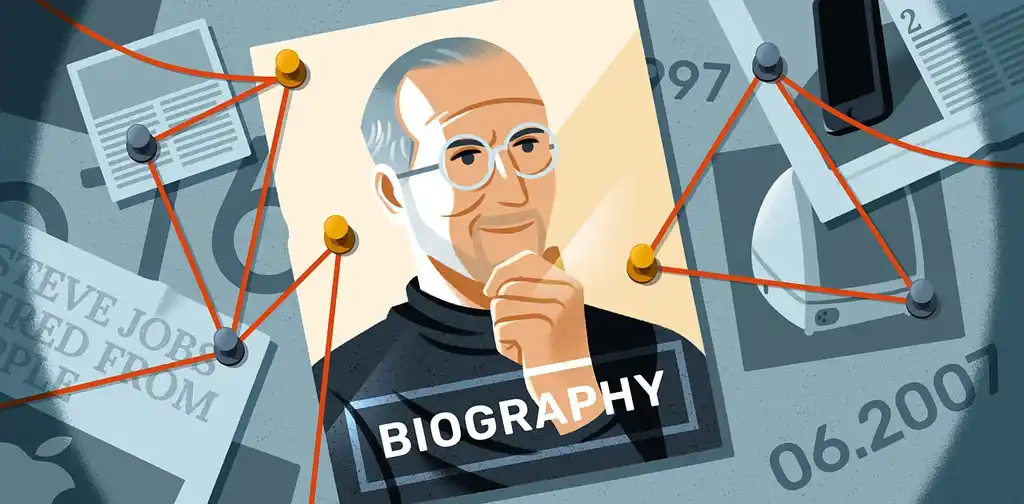
FREE RESOURCE
Biography Outline Template
Craft a satisfying story arc for your biography with our free template.
While you technically don’t need permission to write about public figures (or deceased ones), that doesn't guarantee their legal team won't pursue legal action against you. Author Kitty Kelley was sued by Frank Sinatra before she even started to write His Way , a biography that paints Ol Blue Eyes in a controversial light. (Kelley ended up winning the lawsuit, however).

Whenever feasible, advise the subject’s representatives of your intentions. If all goes according to plan, you’ll get a green light to proceed, or potentially an offer to collaborate. It's a matter of common sense; if someone were to write a book about you, you would likely want to know about it well prior to publication. So, make a sincere effort to reach out to their PR staff to negotiate an agreement or at least a mutual understanding of the scope of your project.
At the same time, make sure that you still retain editorial control over the project, and not end up writing a puff piece that treats its protagonist like a saint or hero. No biography can ever be entirely objective, but you should always strive for a portrayal that closely aligns with facts and reality.
If you can’t get an answer from your subject, or you’re asked not to proceed forward, you can still accept the potential repercussions and write an unauthorized biography . The “rebellious act” of publishing without consent indeed makes for great marketing, though it’ll likely bring more headaches with it too.
✋ Please note that, like other nonfiction books, if you intend to release your biography with a publishing house , you can put together a book proposal to send to them before you even write the book. If they like it enough, they might pay you an advance to write it.
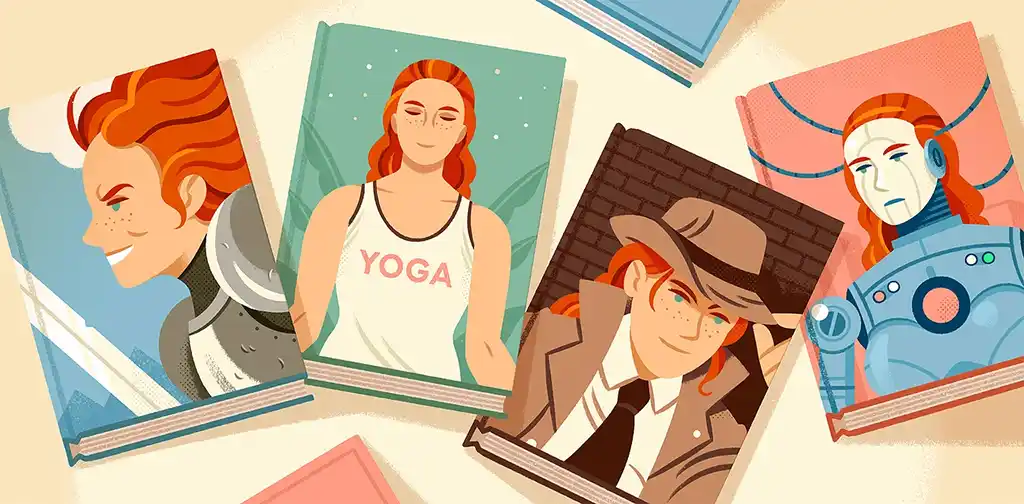
Book Proposal Template
Craft a professional pitch for your nonfiction book with our handy template.
Once you’ve settled (or not) the permission part, it’s time to dive deep into your character’s story.
Deep and thorough research skills are the cornerstone of every biographer worth their salt. To paint a vivid and accurate portrait of someone's life, you’ll have to gather qualitative information from a wide range of reliable sources.
Start with the information already available, from books on your subject to archival documents, then collect new ones firsthand by interviewing people or traveling to locations.
Browse the web and library archives
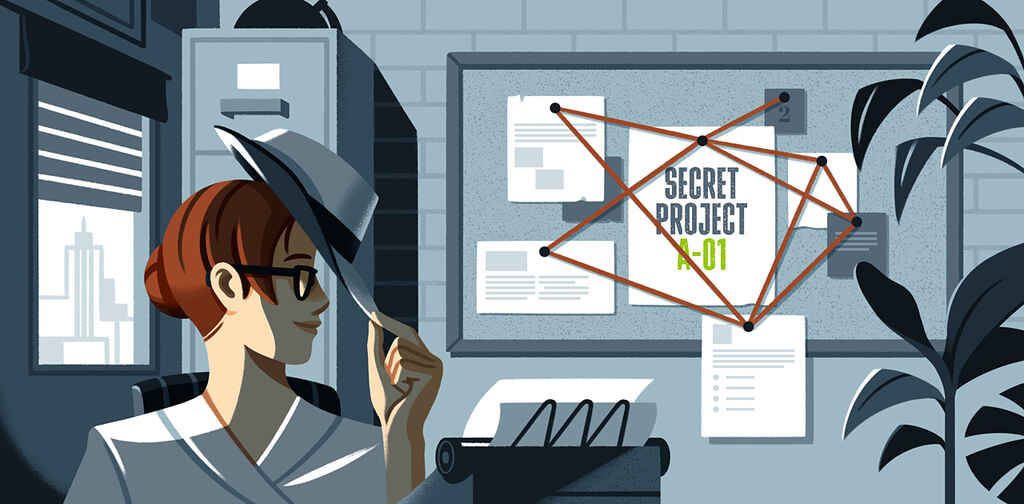
Put your researcher hat on and start consuming any piece on your subject you can find, from their Wikipedia page to news articles, interviews, TV and radio appearances, YouTube videos, podcasts, books, magazines, and any other media outlets they may have been featured in.
Establish a system to orderly collect the information you find 一 even seemingly insignificant details can prove valuable during the writing process, so be sure to save them.
Depending on their era, you may find most of the information readily available online, or you may need to search through university libraries for older references.
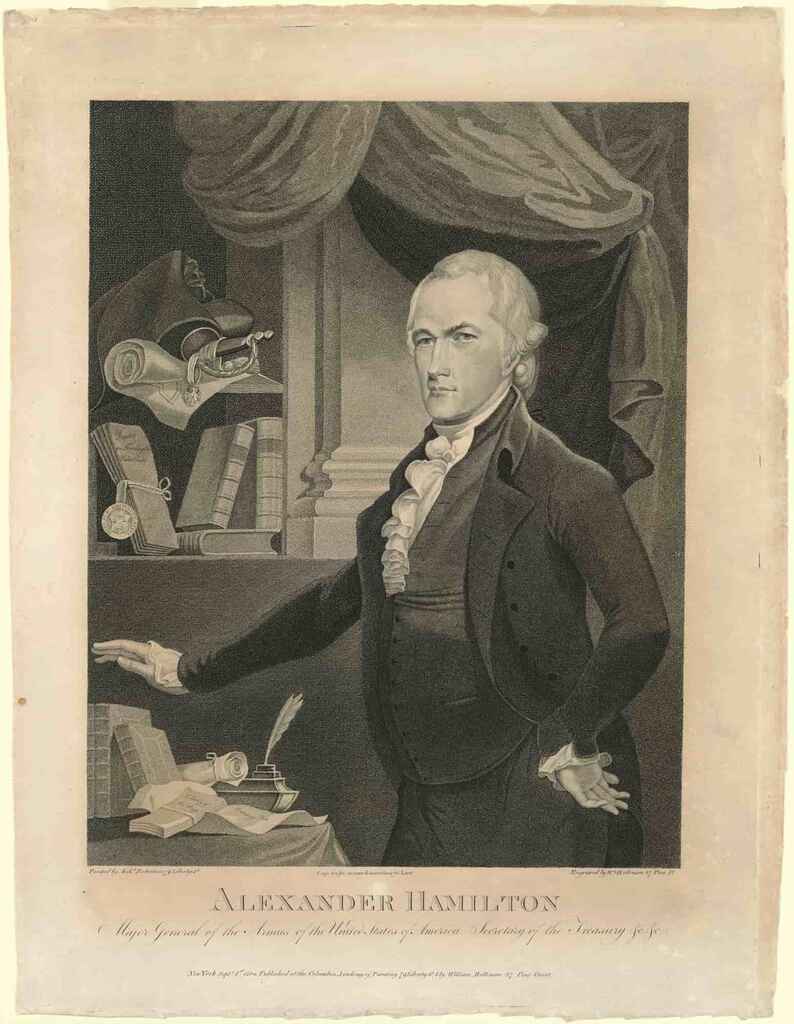
For his landmark biography of Alexander Hamilton, Ron Chernow spent untold hours at Columbia University’s library , reading through the Hamilton family papers, visiting the New York Historical Society, as well as interviewing the archivist of the New York Stock Exchange, and so on. The research process took years, but it certainly paid off. Chernow discovered that Hamilton created the first five securities originally traded on Wall Street. This finding, among others, revealed his significant contributions to shaping the current American financial and political systems, a legacy previously often overshadowed by other founding fathers. Today Alexander Hamilton is one of the best-selling biographies of all time, and it has become a cultural phenomenon with its own dedicated musical.
Besides reading documents about your subject, research can help you understand the world that your subject lived in.
Try to understand their time and social environment
Many biographies show how their protagonists have had a profound impact on society through their philosophical, artistic, or scientific contributions. But at the same time, it’s worth it as a biographer to make an effort to understand how their societal and historical context influenced their life’s path and work.
An interesting example is Stephen Greenblatt’s Will in the World . Finding himself limited by a lack of verified detail surrounding William Shakespeare's personal life, Greenblatt, instead, employs literary interpretation and imaginative reenactments to transport readers back to the Elizabethan era. The result is a vivid (though speculative) depiction of the playwright's life, enriching our understanding of his world.

Many readers enjoy biographies that transport them to a time and place, so exploring a historical period through the lens of a character can be entertaining in its own right. The Diary of Samuel Pepys became a classic not because people were enthralled by his life as an administrator, but rather from his meticulous and vivid documentation of everyday existence during the Restoration period.
Once you’ve gotten your hands on as many secondary sources as you can find, you’ll want to go hunting for stories first-hand from people who are (or were) close to your subject.
With all the material you’ve been through, by now you should already have a pretty good picture of your protagonist. But you’ll surely have some curiosities and missing dots in their character development to figure out, which you can only get by interviewing primary sources.
Interview friends and associates
This part is more relevant if your subject is contemporary, and you can actually meet up or call with relatives, friends, colleagues, business partners, neighbors, or any other person related to them.
In writing the popular biography of Steve Jobs, Walter Isaacson interviewed more than one hundred people, including Jobs’s family, colleagues, former college mates, business rivals, and the man himself.
🔍 Read other biographies to get a sense of what makes a great one. Check out our list of the 30 best biographies of all time , or take our 30-second quiz below for tips on which one you should read next.
Which biography should you read next?
Discover the perfect biography for you. Takes 30 seconds!
When you conduct your interviews, make sure to record them with high quality audio you can revisit later. Then use tools like Otter.ai or Descript to transcribe them 一 it’ll save you countless hours.
You can approach the interview with a specific set of questions, or follow your curiosity blindly, trying to uncover revealing stories and anecdotes about your subject. Whatever your method, author and biography editor Tom Bromley suggests that every interviewer arrives prepared, "Show that you’ve done your work. This will help to put the interviewee at ease, and get their best answers.”
Bromley also places emphasis on the order in which you conduct interviews. “You may want to interview different members of the family or friends first, to get their perspective on something, and then go directly to the main interviewee. You'll be able to use that knowledge to ask sharper, more specific questions.”
Finally, consider how much time you have with each interviewee. If you only have a 30-minute phone call with an important person, make it count by asking directly the most pressing questions you have. And, if you find a reliable source who is also particularly willing to help, conduct several interviews and ask them, if appropriate, to write a foreword as part of the book’s front matter .
Sometimes an important part of the process is packing your bags, getting on a plane, and personally visiting significant places in your character’s journey.
Visit significant places in their life
A place, whether that’s a city, a rural house, or a bodhi tree, can carry a particular energy that you can only truly experience by being there. In putting the pieces together about someone’s life, it may be useful to go visit where they grew up, or where other significant events of their lives happened. It will be easier to imagine what they experienced, and better tell their story.
In researching The Lost City of Z , author David Grann embarked on a trek through the Amazon, retracing the steps of British explorer Percy Fawcett. This led Grann to develop new theories about the circumstances surrounding the explorer's disappearance.
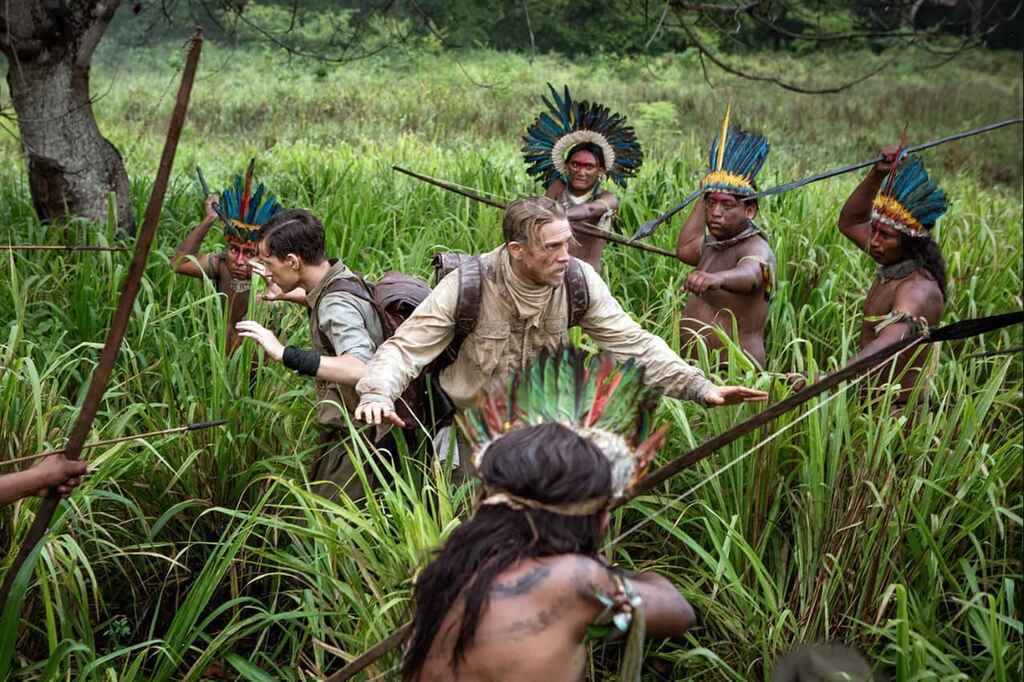
Hopefully, you won’t have to deal with jaguars and anacondas to better understand your subject’s environment, but try to walk into their shoes as much as possible.
Once you’ve researched your character enough, it’s time to put together all the puzzle pieces you collected so far.
Take the bulk of notes, media, and other documents you’ve collected, and start to give them some order and structure. A simple way to do this is by creating a timeline.
Create a chronological timeline
It helps to organize your notes chronologically 一 from childhood to the senior years, line up the most significant events of your subject’s life, including dates, places, names and other relevant bits.
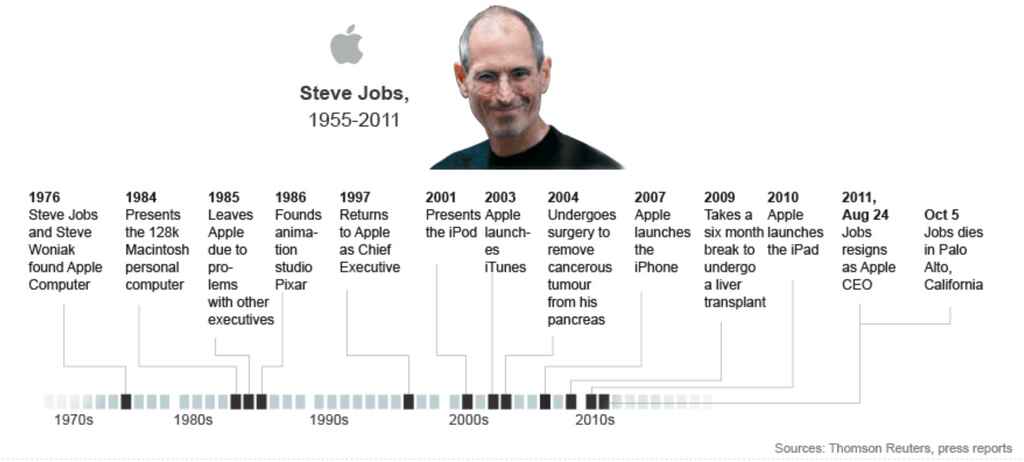
You should be able to divide their life into distinct periods, each with their unique events and significance. Based on that, you can start drafting an outline of the narrative you want to create.
Draft a story outline
Since a biography entails writing about a person’s entire life, it will have a beginning, a middle, and an end. You can pick where you want to end the story, depending on how consequential the last years of your subject were. But the nature of the work will give you a starting character arc to work with.
To outline the story then, you could turn to the popular Three-Act Structure , which divides the narrative in three main parts. In a nutshell, you’ll want to make sure to have the following:
- Act 1. Setup : Introduce the protagonist's background and the turning points that set them on a path to achieve a goal.
- Act 2. Confrontation : Describe the challenges they encounter, both internal and external, and how they rise to them. Then..
- Act 3. Resolution : Reach a climactic point in their story in which they succeed (or fail), showing how they (and the world around them) have changed as a result.
Only one question remains before you begin writing: what will be the main focus of your biography?
Think about why you’re so drawn to your subject to dedicate years of your life to recounting their own. What aspect of their life do you want to highlight? Is it their evil nature, artistic genius, or visionary mindset? And what evidence have you got to back that up? Find a central thesis or focus to weave as the main thread throughout your narrative.
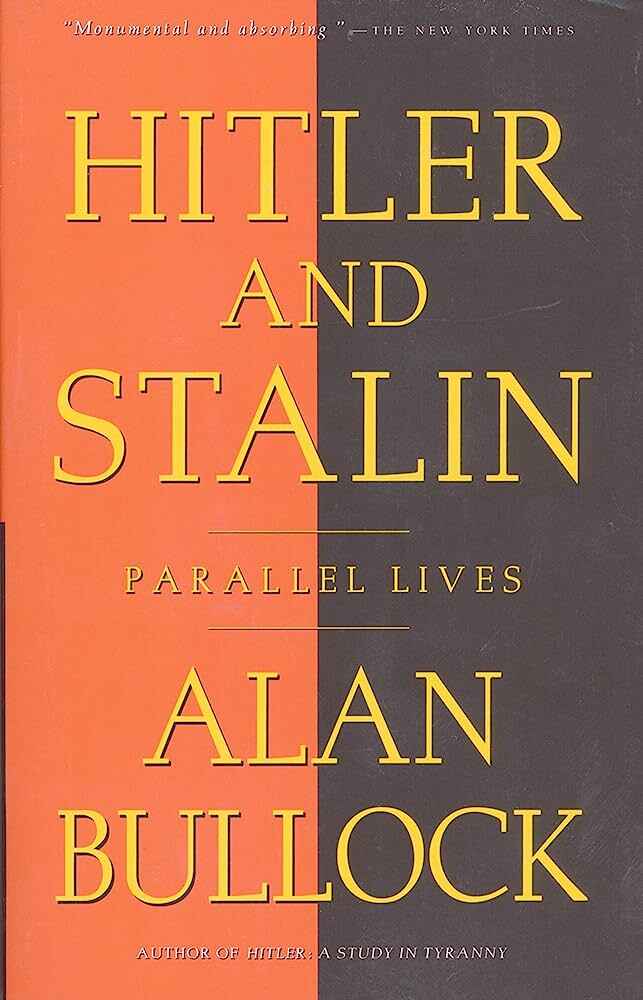
Or find a unique angle
If you don’t have a particular theme to explore, finding a distinct angle on your subject’s story can also help you distinguish your work from other biographies or existing works on the same subject.
Plenty of biographies have been published about The Beatles 一 many of which have different focuses and approaches:
- Philip Norman's Shout is sometimes regarded as leaning more towards a pro-Lennon and anti-McCartney stance, offering insights into the band's inner dynamics.
- Ian McDonald's Revolution in the Head closely examines their music track by track, shifting the focus back to McCartney as a primary creative force.
- Craig Brown's One Two Three Four aims to capture their story through anecdotes, fan letters, diary entries, and interviews.
- Mark Lewisohn's monumental three-volume biography, Tune In , stands as a testament to over a decade of meticulous research, chronicling every intricate detail of the Beatles' journey.
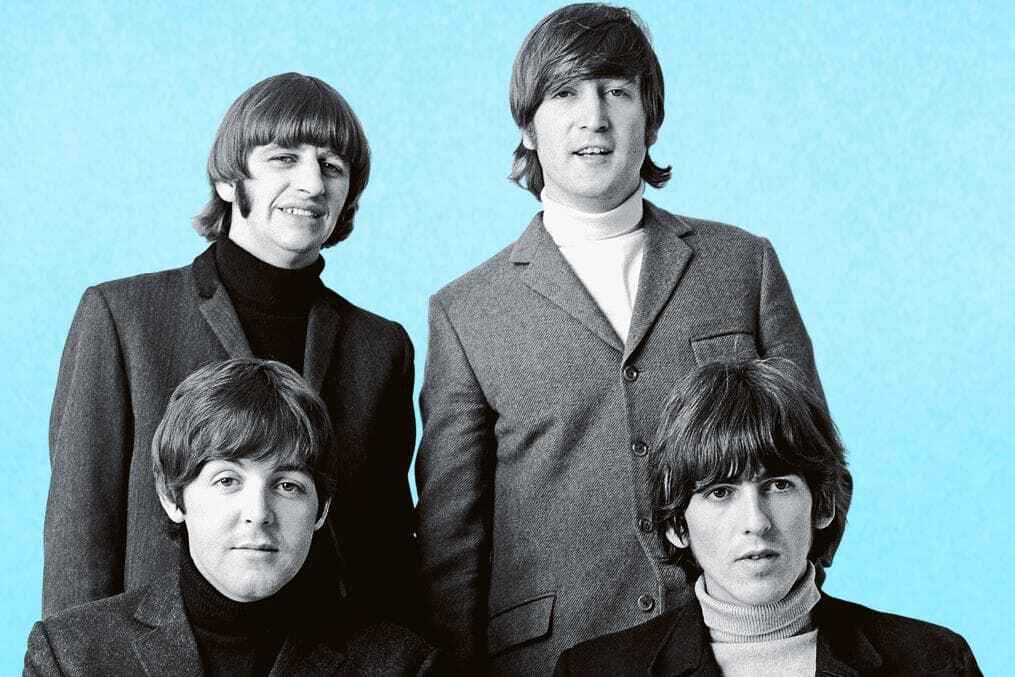
Finally, consider that biographies are often more than recounting the life of a person. Similar to how Dickens’ Great Expectations is not solely about a boy named Pip (but an examination and critique of Britain’s fickle, unforgiving class system), a biography should strive to illuminate a broader truth — be it social, political, or human — beyond the immediate subject of the book.
Once you’ve identified your main focus or angle, it’s time to write a great story.
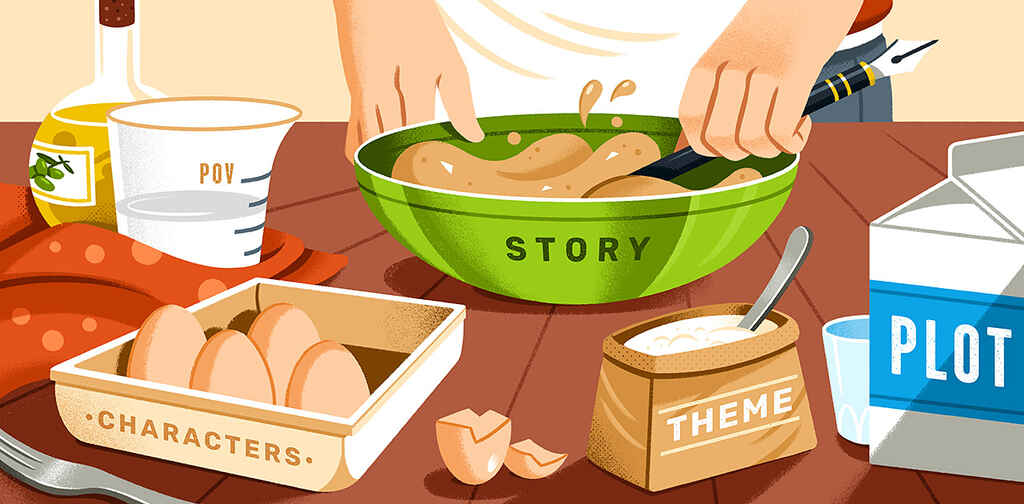
While biographies are often highly informative, they do not have to be dry and purely expository in nature . You can play with storytelling elements to make it an engaging read.
You could do that by thoroughly detailing the setting of the story , depicting the people involved in the story as fully-fledged characters , or using rising action and building to a climax when describing a particularly significant milestone of the subject’s life.
One common way to make a biography interesting to read is starting on a strong foot…
Hook the reader from the start
Just because you're honoring your character's whole life doesn't mean you have to begin when they said their first word. Starting from the middle or end of their life can be more captivating as it introduces conflicts and stakes that shaped their journey.
When he wrote about Christopher McCandless in Into the Wild , author Jon Krakauer didn’t open his subject’s childhood and abusive family environment. Instead, the book begins with McCandless hitchhiking his way into the wilderness, and subsequently being discovered dead in an abandoned bus. By starting in the middle of the action in medias res, Krakauer hooks the reader’s interest, before tracing back the causes and motivations that led McCandless to die alone in that bus in the first place.
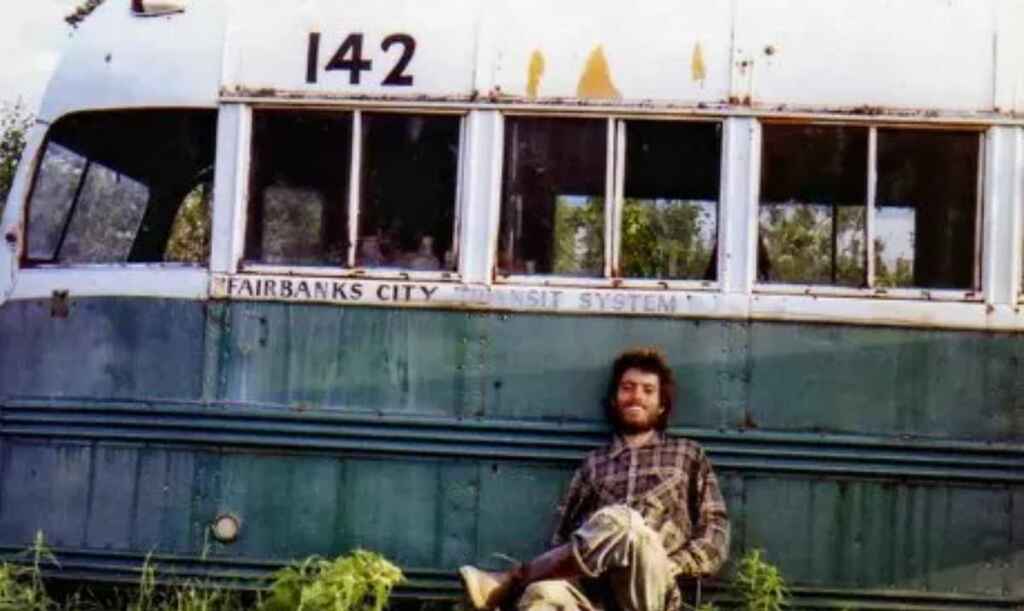
You can bend the timeline to improve the reader’s reading experience throughout the rest of the story too…
Play with flashback
While biographies tend to follow a chronological narrative, you can use flashbacks to tell brief stories or anecdotes when appropriate. For example, if you were telling the story of footballer Lionel Messi, before the climax of winning the World Cup with Argentina, you could recall when he was just 13 years old, giving an interview to a local newspaper, expressing his lifelong dream of playing for the national team.
Used sparsely and intentionally, flashbacks can add more context to the story and keep the narrative interesting. Just like including dialogue does…
Reimagine conversations
Recreating conversations that your subject had with people around them is another effective way to color the story. Dialogue helps the reader imagine the story like a movie, providing a deeper sensory experience.

One thing is trying to articulate the root of Steve Jobs’ obsession with product design, another would be to quote his father , teaching him how to build a fence when he was young: “You've got to make the back of the fence just as good looking as the front of the fence. Even though nobody will see it, you will know. And that will show that you're dedicated to making something perfect.”
Unlike memoirs and autobiographies, in which the author tells the story from their personal viewpoint and enjoys greater freedom to recall conversations, biographies require a commitment to facts. So, when recreating dialogue, try to quote directly from reliable sources like personal diaries, emails, and text messages. You could also use your interview scripts as an alternative to dialogue. As Tom Bromley suggests, “If you talk with a good amount of people, you can try to tell the story from their perspective, interweaving different segments and quoting the interviewees directly.”

FREE COURSE
How to Write Believable Dialogue
Master the art of dialogue in 10 five-minute lessons.
These are just some of the story elements you can use to make your biography more compelling. Once you’ve finished your manuscript, it’s a good idea to ask for feedback.
If you’re going to publish your own biography, you’ll have to polish it to professional standards. After leaving your work to rest for a while, look at it with fresh eyes and edit your own manuscript eliminating passive voice, filler words, and redundant adverbs.
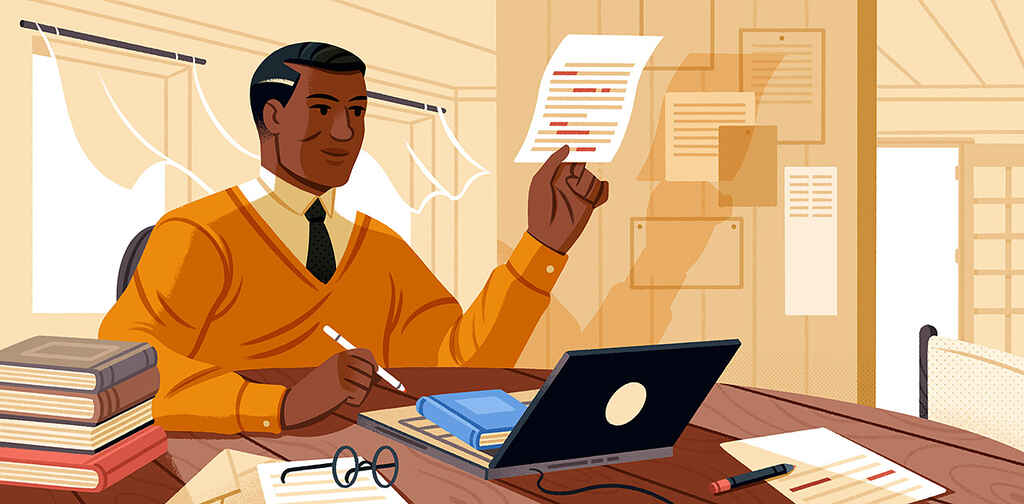
Then, have a professional editor give you a general assessment. They’ll look at the structure and shape of your manuscript and tell you which parts need to be expanded on or cut. As someone who edited and commissioned several biographies, Tom Bromley points out that a professional “will look at the sources used and assess whether they back up the points made, or if more are needed. They would also look for context, and whether or not more background information is needed for the reader to understand the story fully. And they might check your facts, too.”
In addition to structural editing, you may want to have someone copy-edit and proofread your work.
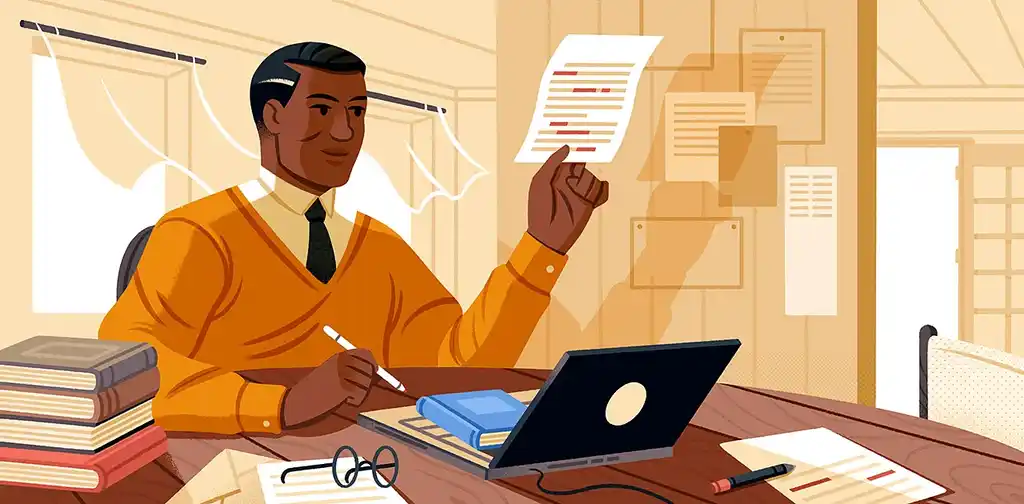
MEET EDITORS
Polish your book with expert help
Sign up, meet 1500+ experienced editors, and find your perfect match.
Importantly, make sure to include a bibliography with a list of all the interviews, documents, and sources used in the writing process. You’ll have to compile it according to a manual of style, but you can easily create one by using tools like EasyBib . Once the text is nicely polished and typeset in your writing applications , you can prepare for the publication process.
In conclusion, by mixing storytelling elements with diligent research, you’ll be able to breathe life into a powerful biography that immerses readers in another individual’s life experience. Whether that’ll spark inspiration or controversy, remember you could have an important role in shaping their legacy 一 and that’s something not to take lightly.
Continue reading
Recommended posts from the Reedsy Blog

450+ Powerful Adjectives to Describe a Person (With Examples)
Want a handy list to help you bring your characters to life? Discover words that describe physical attributes, dispositions, and emotions.

How to Plot a Novel Like a NYT Bestselling Author
Need to plot your novel? Follow these 7 steps from New York Times bestselling author Caroline Leavitt.

How to Write an Autobiography: The Story of Your Life
Want to write your autobiography but aren’t sure where to start? This step-by-step guide will take you from opening lines to publishing it for everyone to read.

What is the Climax of a Story? Examples & Tips
The climax is perhaps a story's most crucial moment, but many writers struggle to stick the landing. Let's see what makes for a great story climax.

What is Tone in Literature? Definition & Examples
We show you, with supporting examples, how tone in literature influences readers' emotions and perceptions of a text.

Writing Cozy Mysteries: 7 Essential Tips & Tropes
We show you how to write a compelling cozy mystery with advice from published authors and supporting examples from literature.
Join a community of over 1 million authors
Reedsy is more than just a blog. Become a member today to discover how we can help you publish a beautiful book.

We made a writing app for you
Yes, you! Write. Format. Export for ebook and print. 100% free, always.

1 million authors trust the professionals on Reedsy. Come meet them.
Enter your email or get started with a social account:

IMAGES
VIDEO
COMMENTS
Personal background questions. You can include a few personal details in a professional biography to tell the reader about your background, passions and personality. You can choose to add personal details that relate to your current career to promote cohesion in your biography. Here is some personal information you can include: What is your name?
Writing a biography is an incredible way to preserve someone's life story and share their experiences with the world. Whether you are writing a biography for a loved one, a historical figure, or a notable personality, having a list of well-thought-out questions is essential to gather all the necessary information.
Conduct relevant interviews. Whenever possible, seek firsthand accounts from those who knew or interacted with the subject. Conduct interviews with family members, friends, colleagues, or experts in the field. Their insights and anecdotes can provide a deeper understanding of the person's character and experiences.
12. How do you think your colleagues would describe you? 13. What do you want to make sure you do before you die? 14. What's a goal you have for yourself that you want to accomplish in the next year? 15. Name a few of your daily habits (other than a shower and brushing your teeth). 16.
7. What did an ordinary day in your life look like? 8. Name a big success story for you during this time. 9. Did you travel? What was your most memorable vacation? Hopefully writing your biography just got a little easier and these prompts have got your brains in gear, recalling all sorts of different memories from your childhood all the way ...
In my article Interviewing for biography: interrogation, conversation, and the in-between, I wrote about different approaches to biographical interviews.The approach you choose may influence the types of questions you choose to ask. In addition, what you choose to ask will be influenced by your objectives and the research you've conducted previously.
A chronological approach to biographical interviews involves starting the interview by asking about the interviewee's early life, starting with their birth, moving through childhood and adolescence then into adult life until you reach the present day. The interviewer may even choose to start earlier, asking about the interviewee's parents ...
What, if anything, surprised you? If this person impacted history, discuss what may have been different without his or her presence. What did you learn about the time period in which the book is set that you did not previously know? Discuss the time period in history that each person in the group enjoys reading about most, and why. Has reading ...
From here, you should have the information you need to settle on your structure. This will give you an idea of which outline best serves the facts. From that outline, you can begin organizing each of the sources and facts you've gathered until you've assembled a blueprint of how the final biography will look.
Keep it simple. As well as starting with easier questions, keep the conversation simple by asking only one question at a time: avoid double-barrelled questions. Asking more than one question at a time may result in the interviewee choosing to only answer one part, either intentionally or simply because they forgot and if they forget, it means ...
As you listen to their answers be thinking of immediate follow-up questions that help you dive deeper into the story. Practice active-listening techniques. Don't exclusively ask about life events. Reading or listening to a story that is simply recounting a chronological list of life experiences isn't interesting or engaging.
The biography questions listed here are designed to uncover the personal and human side of these figures, providing insights into their daily lives, relationships, and personal philosophies. Students can gain a broader perspective, going beyond the standard facts and dates to truly connect with these individuals on a more personal level.
Below are 50 Biography Questions to ask your parents or grandparents to learn more about their life stories and your family history. As a Legacy Video producer, I ask well over 100 questions in an interview so be sure to add your own to the list. And don't forget to ask follow-up questions!
See why leading organizations rely on MasterClass for learning & development. Biographies are how we learn information about another human being's life. Whether you want to start writing a biography about a famous person, historical figure, or an influential family member, it's important to know all the elements that make a biography worth ...
Including Basic Details. Date and place of birth and death. Family information. Lifetime accomplishments. Major events of life. Effects/impact on society, historical significance. While this information is necessary to your project, these dry facts, on their own, don't really make a very good biography.
Also, most interviewees appreciate receiving a few questions in advance. When sending, indicate that they are simply food for thought and the interview will not follow a rigid format. If only one interview is done with a subject, ask a variety of questions on different topics. You might check out our top 10 list as a handy reference, listed below.
120 Questions to Ask When Interviewing Someone About Their Life. When embarking on the journey of interviewing someone about their life, we delve into the rich tapestry of their experiences, beliefs, and lessons learned. This collection of questions serves as a key to unlocking the treasure trove of stories that every individual carries. These ...
These 351 writing prompts and questions are part of a 28 article, 108 category series entitled " 7,500-plus Questions About Life to Ask People When Writing Narratives .". I have divided the writing prompts and questions to ask others into the following categories. Click on the category to be taken to the questions.
I have developed long list of questions and have been practicing ways to interject follow up questions such as "You mentioned '(interviewee quote)' can you tell me more about that?". My problem lies in the questions I formulated. I went from basic questions hoping that the person would provide great detail to more specific open-ended questions.
Here are a few tips on how to ask questions to bring out the best stories: Frame questions to be open-ended. Begin questions with "Why", "How", "Can you describe…", "Tell me about...". You are looking for more than a yes or no answer. Less is more. The less specific you are in your questions, the more room you allow for the ...
Show the biography to others for feedback. Once you have completed a draft of the biography, show it to peers, friends, teachers, and mentors for feedback. Ask them if they get a good sense of the person's life and if the biography is easy to read. Be open to feedback so you can improve the biography and make it better.
If you're looking to write a biography yourself, in this post we'll share a step-by-step blueprint that you can follow. How to write a biography: 1. Seek permission when possible. 2. Research your subject thoroughly. 3. Do interviews and visit locations. 4.
These questions may be useful in developing your information about the mathematician. They were selected from two websites: Some Biography Interview Questions